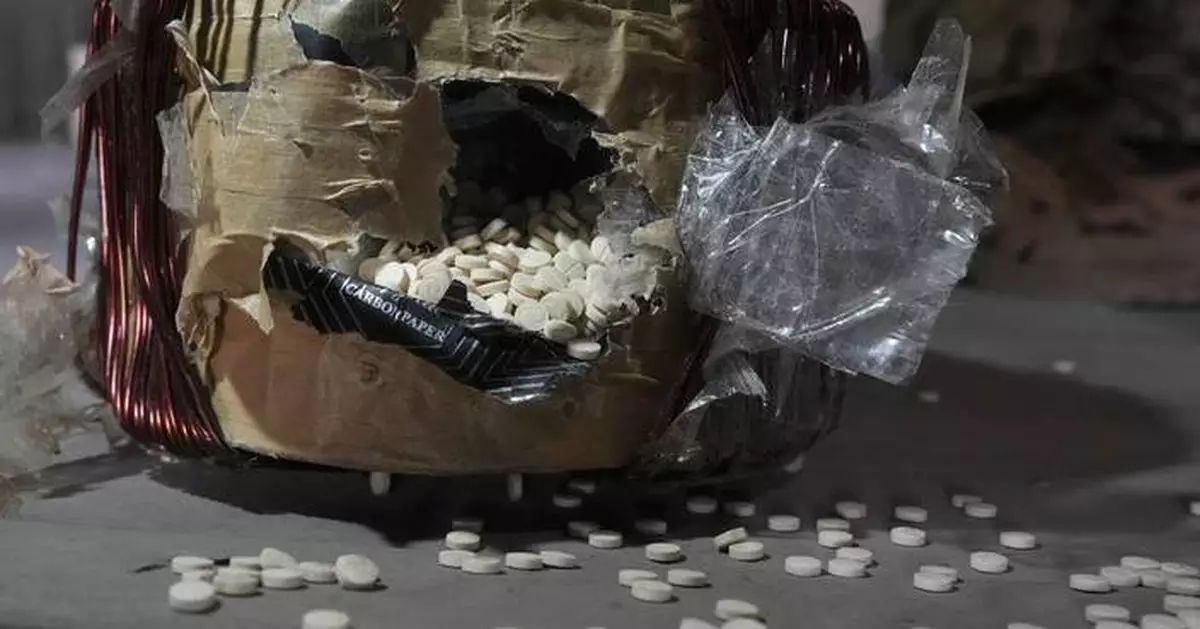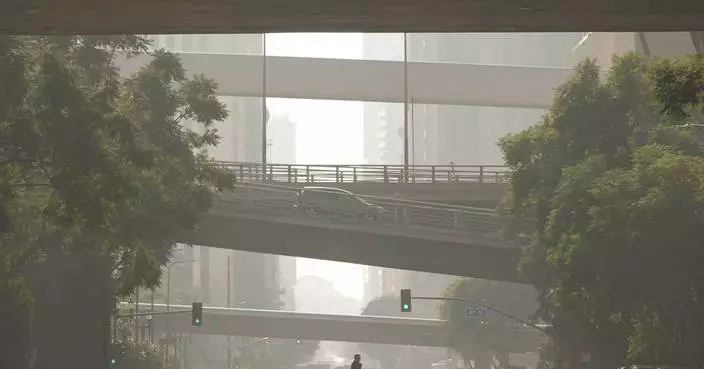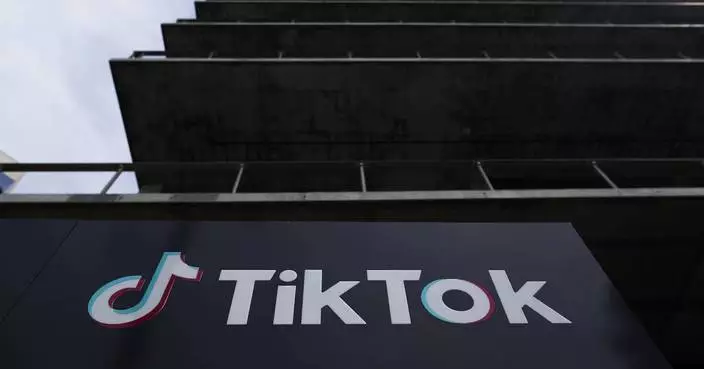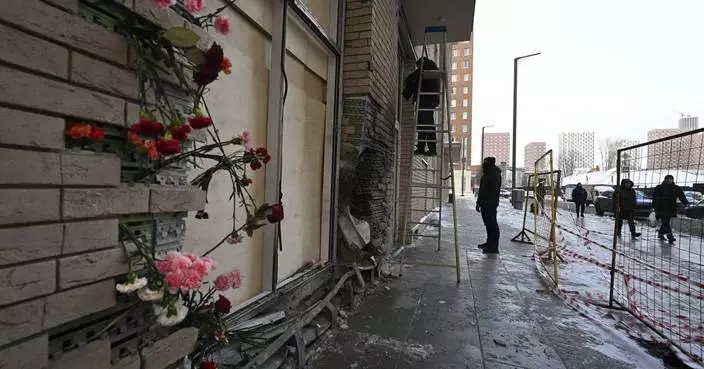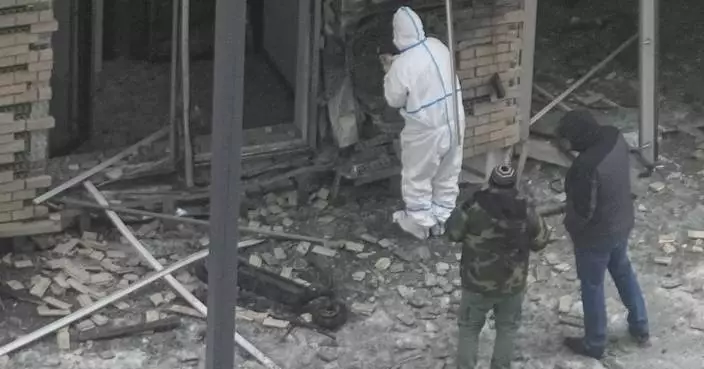BEIRUT (AP) — Since the fall of former Syrian President Bashar Assad, industrial-scale manufacturing facilities of the amphetamine-like stimulant Captagon have been uncovered around the country, which experts say fed a $10 billion annual global trade in the highly addictive drug.
Among the locations used for manufacturing the drug were the Mazzeh air base in Damascus, a car-trading company in Latakia and a factory that once made snack chips in the Damascus suburb of Douma. Government forces seized the factory in 2018.
Click to Gallery
A Syrian member of the rebel group inspect material for manufacturing amphetamine pills, known as Captagon, hidden at the warehouse where the drug was manufactured before the fall of Bashar Assad government at a facility in Douma city, outskirts of Damascus, Syria, Friday, Dec. 13, 2024. (AP Photo/Hussein Malla)
A Syrian member of the rebel group unloads amphetamine pills, known as Captagon, hidden inside an electrical component at the warehouse where the drug was manufactured before the fall of Bashar Assad government at a facility in Douma city, outskirts of Damascus, Syria, Friday, Dec. 13, 2024. (AP Photo/Hussein Malla)
A Syrian member of the rebel group shows liquid material for manufacturing amphetamine pills known as Captagon hidden, at the warehouse where the drug was manufactured before the fall of Bashar Assad government at a facility in Douma city, outskirts of Damascus, Syria, Friday, Dec. 13, 2024. (AP Photo/Hussein Malla)
A Syrian member of the rebel group shows machines that were used to manufacturing amphetamine pills known as Captagon, at the warehouse where the drug was manufactured before the fall of Bashar Assad government at a facility in Douma city, outskirts of Damascus, Syria, Friday, Dec. 13, 2024. (AP Photo/Hussein Malla)
Syrian members of the rebel group inspecting electrical components that were used to hide amphetamine pills known as Captagon hidden at the warehouse where the drug was manufactured before the fall of Bashar Assad government at a facility in Douma city, outskirts of Damascus, Syria, Friday, Dec. 13, 2024. (AP Photo/Hussein Malla)
A Syrian member of the rebel group shows materials for manufacturing amphetamine pills known as Captagon, at the warehouse where the drug was manufactured before the fall of Bashar Assad government at a facility in Douma city, outskirts of Damascus, Syria, Friday, Dec. 13, 2024. (AP Photo/Hussein Malla)
Syrian members of the rebel group walk at a warehouse where the amphetamine pills known as Captagon was manufactured before the fall of Bashar Assad government in Douma city, outskirts of Damascus, Syria, Friday, Dec. 13, 2024. (AP Photo/Hussein Malla)
Amphetamine pills, known as Captagon, which were prepare to be hidden inside electrical components, are seen at the warehouse where the drug was manufactured before the fall of Bashar Assad government at a facility in Douma city, outskirts of Damascus, Syria, Friday, Dec. 13, 2024. (AP Photo/Hussein Malla)
A Syrian member of the rebel group walks at a warehouse where the amphetamine pills known as Captagon were manufactured before the fall of Bashar Assad government in Douma city, outskirts of Damascus, Syria, Friday, Dec. 13, 2024. (AP Photo/Hussein Malla)
A Syrian member of the rebel shows amphetamine pills known as Captagon hidden inside an electrical component at a warehouse where the drug was manufactured before the fall of Bashar Assad's government at a facility in Douma city, outskirts of Damascus, Syria, Friday, Dec. 13, 2024. (AP Photo/Hussein Malla)
Amphetamine pills, known as Captagon, are seen inside electrical components as they were prepared to be hidden, at the warehouse where the drug was manufactured before the fall of Bashar Assad government at a facility in Douma city, outskirts of Damascus, Syria, Friday, Dec. 13, 2024. (AP Photo/Hussein Malla)
Amphetamine pills, known as Captagon, hidden inside an electrical component at the warehouse where the drug was manufactured before the fall of Bashar Assad government at a facility in Douma city, outskirts of Damascus, Syria, Friday, Dec. 13, 2024. (AP Photo/Hussein Malla)
“Assad’s collaborators controlled this place. After the regime fell ... I came here and found it on fire,” Firas al-Toot, the original owner of the factory, told The Associated Press. “They came at night and lit the drugs on fire but couldn’t burn everything.”
“From here, Captagon pills emerged to kill our people,” Abu Zihab, an activist with Hayat Tahrir al-Sham, the main group now ruling the country, said while his group gave journalists access to the site.
Syria's nearly 14-year-old civil war fragmented the country, crumbled the economy and created fertile ground for the production of the drug. Militias, warlords and the Assad government transformed the production of Captagon from a small-scale operation run by criminal groups into a billion-dollar industrial revenue stream.
The recent ousting of Assad has disrupted these networks and has given a closer look at its operations — revealing the workings of a war economy that sustained Assad’s power over Syria. Experts say the change in Syria might create an opportunity to dismantle the Captagon industry.
Captagon was first developed in Germany in the 1960s as a prescription stimulant for conditions like narcolepsy. It was later outlawed due to heart issues and its addictive properties.
Its amphetamine-like effects made it popular in the Middle East among both elites and fighters, as it enhanced focus and reduced fatigue.
Assad's government recognized an opportunity in the cheaply manufactured drug amid Syria’s economic turmoil and the heavy sanctions imposed on it.
Captagon is produced through a simple chemical process that involves mixing amphetamine derivatives with excipients to form tablets, typically in makeshift labs.
The Captagon trade began industrializing around 2018-2019 as the Assad regime — and other armed groups in Syria -- invested in production facilities, warehouses and trafficking networks. This allowed Syria to emerge as the largest producer of Captagon globally, with some production also occurring in Lebanon.
Most seized consignments of Captagon originated from Syria, according to data by the New Lines Captagon Trade Project, an initiative of the New Lines Institute think tank.
Evidence of the Assad regime’s sponsorship of the Captagon industry is overwhelming, the report published in May said. The Security Office of the 4th Armored Division of the Syrian Arab Army, headed by Bashar al-Assad’s brother Maher oversaw operations and created a coordinated production system, the report added.
Captagon was smuggled across borders in trucks and cargo shipments. Sometimes the drugs were concealed in food, electronics and construction materials to evade detection.
The primary smuggling routes were Syria’s porous borders with Lebanon, Jordan and Iraq, from which the drug was distributed throughout the region. The leading markets are wealthy Gulf countries like Saudi Arabia and the United Arab Emirates.
In Lebanon, the Captagon trade has flourished, particularly near the Syrian border and in the Bekaa Valley. Lebanese authorities struggled to curb the flow of Captagon from Syria, which analysts say was facilitated by the Hezbollah militant group.
Following the discovery of crates of fruit meticulously packed with bundles of the drug hidden among pomegranates and oranges, Saudi Arabia and the UAE implemented bans on Lebanese agricultural products.
Captagon has also found its way as far as Southeast Asia and parts of Europe.
The annual global trade in Captagon had an estimated value of $10 billion, with the ousted Assad family's annual profit reaching around $2.4 billion, according to Caroline Rose, director of the New York-based New Lines Institute Captagon Trade Project.
“Seeing the uncovering of so many industrial-scale facilities affiliated with the regime was shocking but not surprising. There was extensive evidence linking key regime-aligned cronies and Assad family members to the trade,” said Rose, whose organization tracks all publicly recorded Captagon seizures and lab raids.
The discovery of the facilities, she said, confirmed "the concrete relationship between Captagon and the former regime.”
The exact number of factories in Syria remains unclear, but experts and HTS members estimate that there are likely hundreds spread throughout the country.
While neighboring countries have long sought to curb drug trafficking, their influence over Assad was limited.
Saudi Arabia imposed strict penalties for Captagon trafficking and enhanced border security, collaborating with other Gulf states to monitor smuggling routes. However, these efforts faced challenges from the complex networks operating across Syria, Lebanon and Jordan.
Captagon provided Assad's government with leverage to end his political isolation. In recent years, as several Arab states reestablished ties with him, stopping the Captagon trade was a key demand in talks aimed at normalizing relations. In May 2023, Syria was readmitted to the Arab League, where it had been suspended since 2011 due to Assad’s brutal crackdown on protesters.
Syria pledged to clamp down on smuggling, leading to the formation of a regional security coordination committee.
Shortly after the summit and in a possible sign of behind-the-scenes trade-offs, Jordan intensified surveillance along the Syrian border. Activists and experts attributed airstrikes on a known drug kingpin’s home and on a suspected Captagon factory near Daraa to Jordan, likely with Assad’s consent.
Assad has turned Syria into “the largest Captagon factory in the world,” HTS leader Ahmad al-Sharaa stated in a victory speech at Damascus’s Umayyad Mosque on Dec. 8. “Today, Syria is being cleansed, thanks to the grace of Almighty God."
While Assad and his circle may have been the primary beneficiaries, there is also evidence that Syrian opposition groups were involved in drug smuggling. Rebel groups, local militias and organized crime networks manufactured and smuggled the drug to finance their operations, analysts say.
“Likely, we will see a short-term supply reduction in the trade, with a decline in the size and frequency of seizures as industrial-scale production is largely halted. However, criminal actors are innovative, likely seeking out new locations to engage in production and smuggling, particularly as demand levels remain stable,” Rose said.
They may also “seek out alternative illicit trades to engage in instead,” she said.
In addition to dismantling the Captagon trade, the country's transitional government should “establish programs for economic development that will incentivize Syrians to participate in the country’s formal, licit economic sphere,” Rose said.
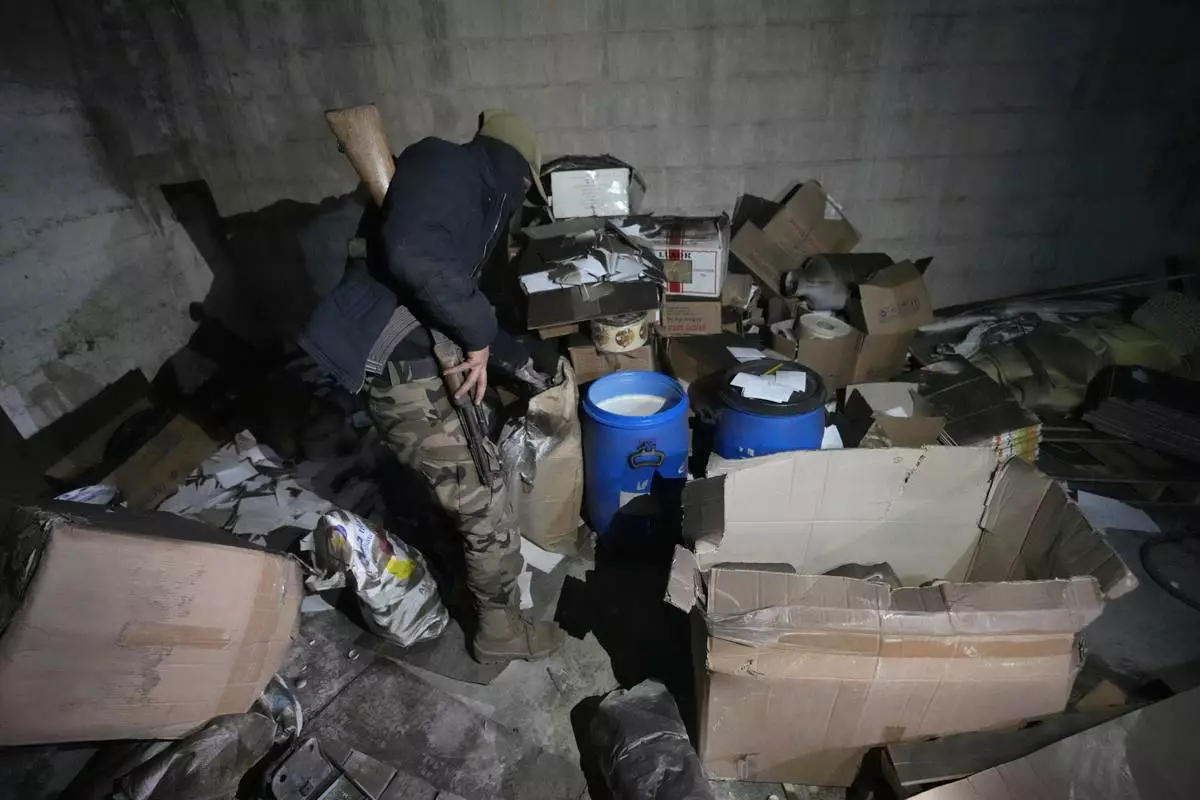
A Syrian member of the rebel group inspect material for manufacturing amphetamine pills, known as Captagon, hidden at the warehouse where the drug was manufactured before the fall of Bashar Assad government at a facility in Douma city, outskirts of Damascus, Syria, Friday, Dec. 13, 2024. (AP Photo/Hussein Malla)
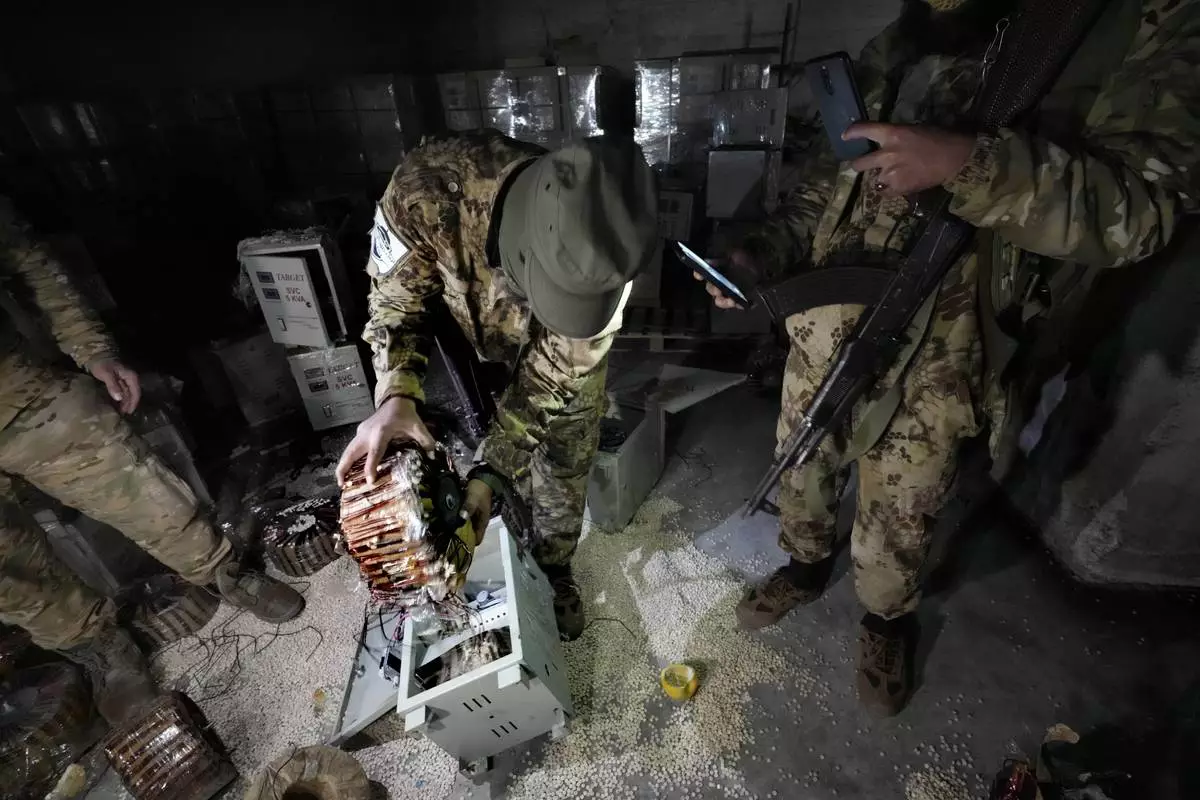
A Syrian member of the rebel group unloads amphetamine pills, known as Captagon, hidden inside an electrical component at the warehouse where the drug was manufactured before the fall of Bashar Assad government at a facility in Douma city, outskirts of Damascus, Syria, Friday, Dec. 13, 2024. (AP Photo/Hussein Malla)
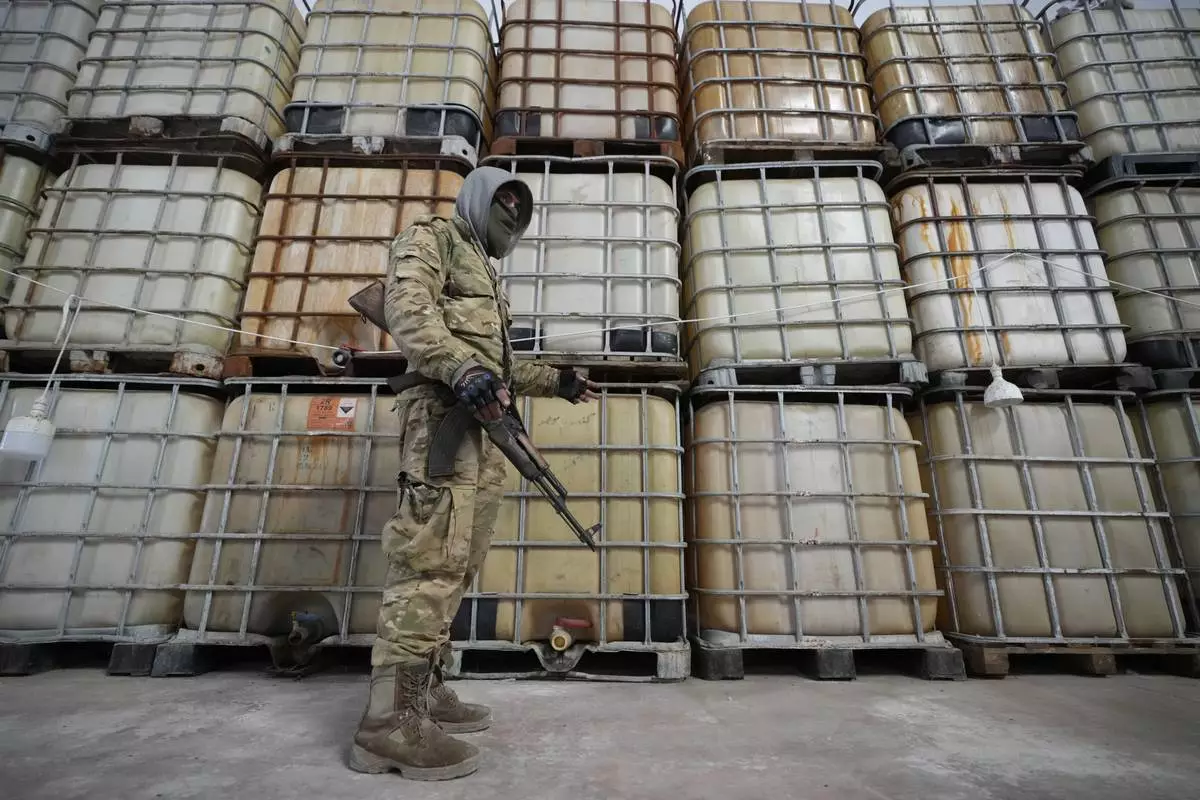
A Syrian member of the rebel group shows liquid material for manufacturing amphetamine pills known as Captagon hidden, at the warehouse where the drug was manufactured before the fall of Bashar Assad government at a facility in Douma city, outskirts of Damascus, Syria, Friday, Dec. 13, 2024. (AP Photo/Hussein Malla)
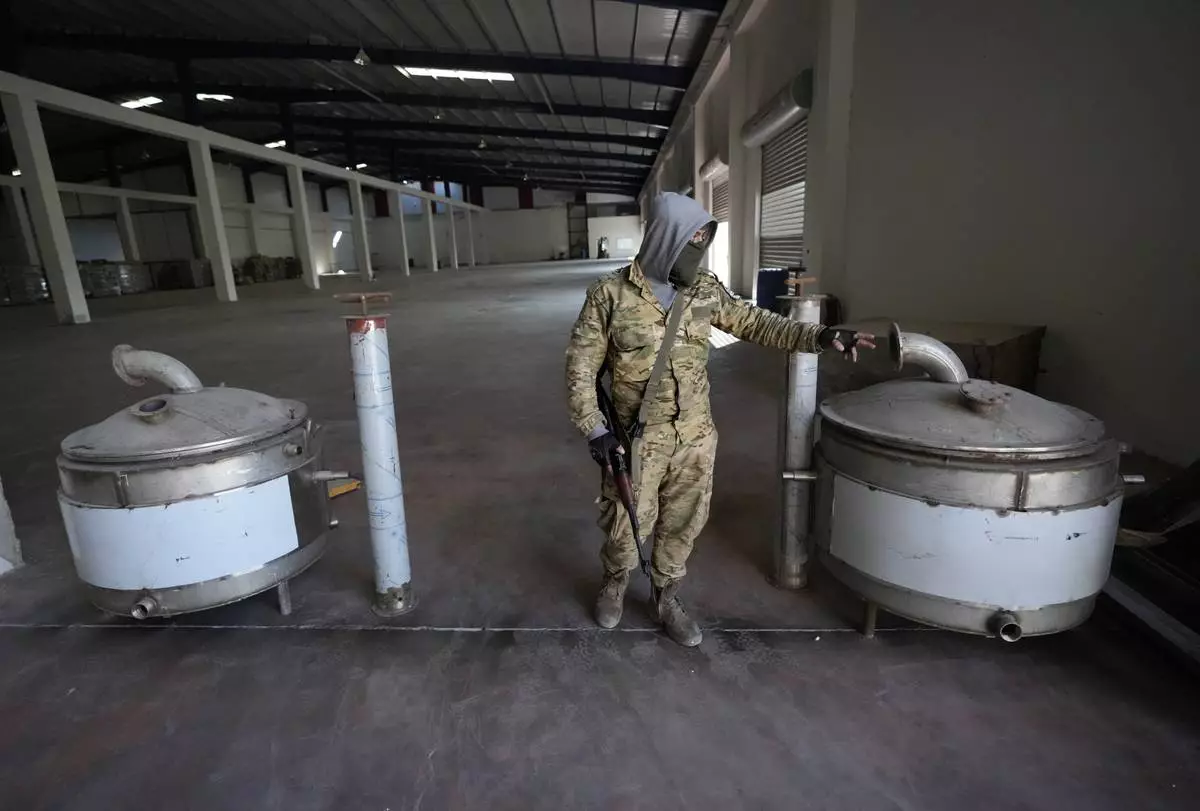
A Syrian member of the rebel group shows machines that were used to manufacturing amphetamine pills known as Captagon, at the warehouse where the drug was manufactured before the fall of Bashar Assad government at a facility in Douma city, outskirts of Damascus, Syria, Friday, Dec. 13, 2024. (AP Photo/Hussein Malla)
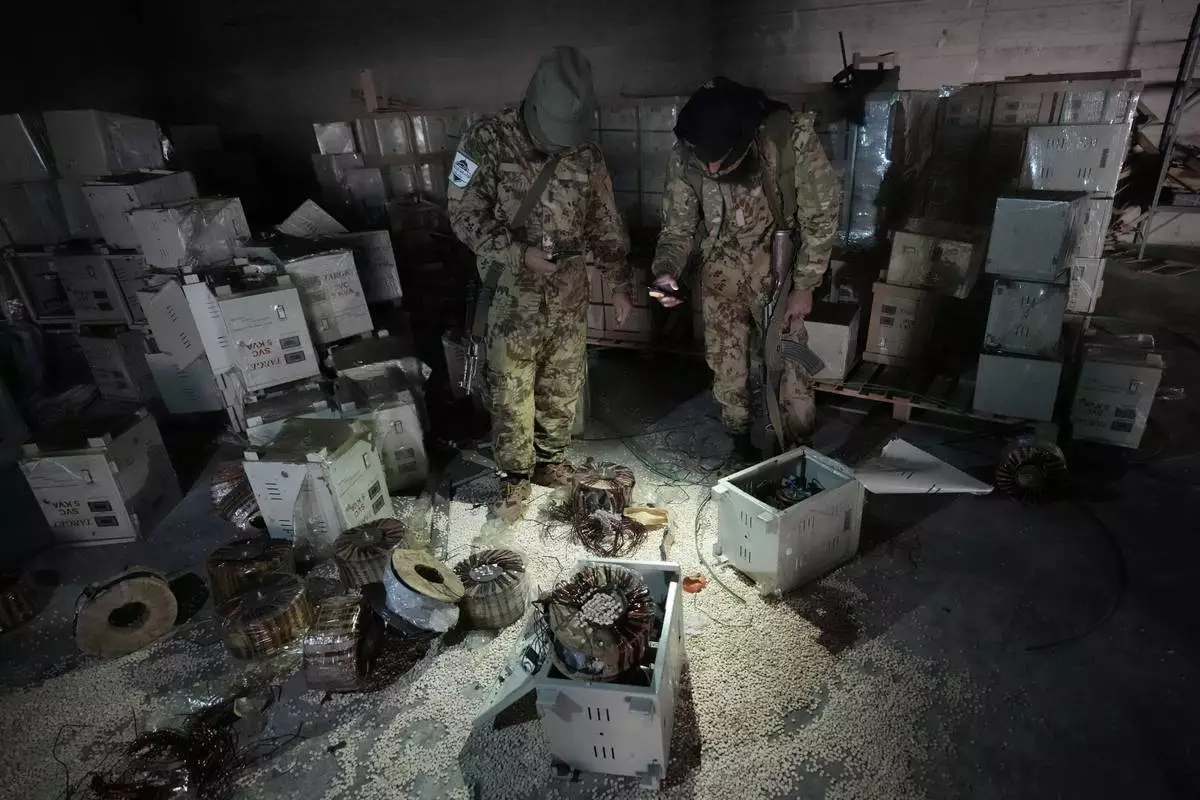
Syrian members of the rebel group inspecting electrical components that were used to hide amphetamine pills known as Captagon hidden at the warehouse where the drug was manufactured before the fall of Bashar Assad government at a facility in Douma city, outskirts of Damascus, Syria, Friday, Dec. 13, 2024. (AP Photo/Hussein Malla)
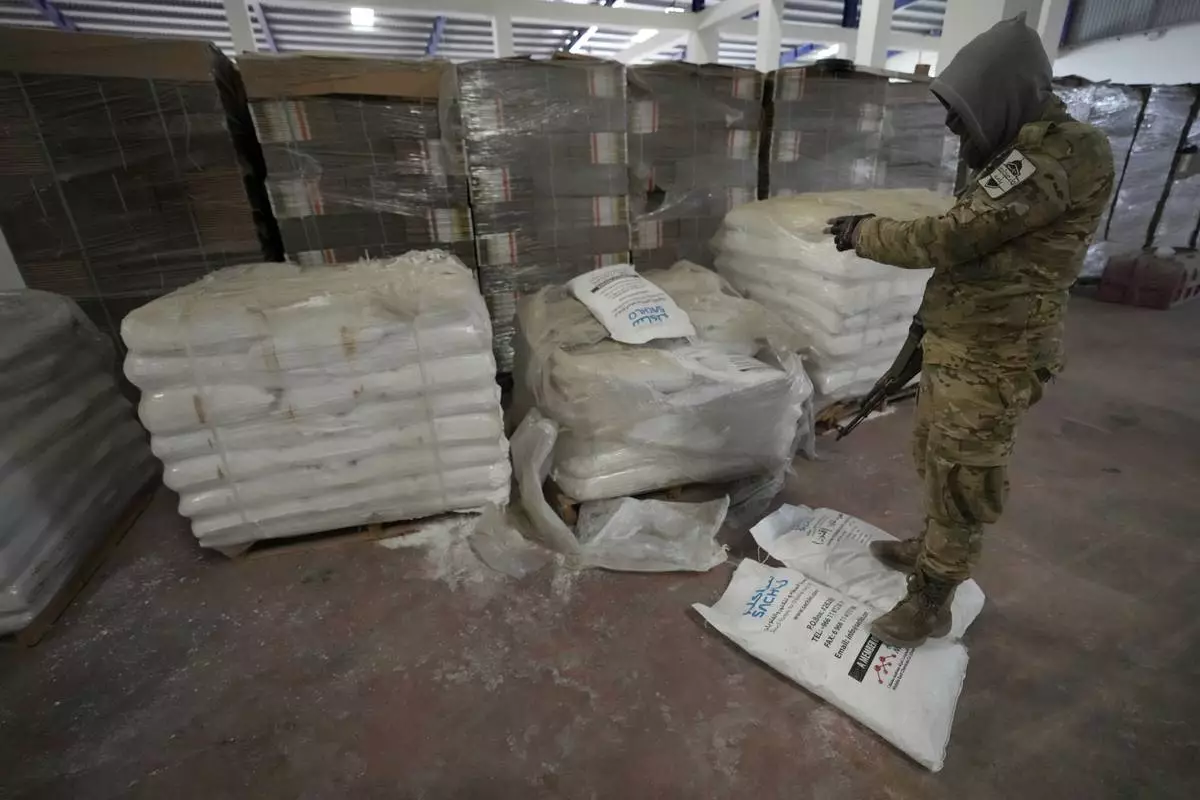
A Syrian member of the rebel group shows materials for manufacturing amphetamine pills known as Captagon, at the warehouse where the drug was manufactured before the fall of Bashar Assad government at a facility in Douma city, outskirts of Damascus, Syria, Friday, Dec. 13, 2024. (AP Photo/Hussein Malla)
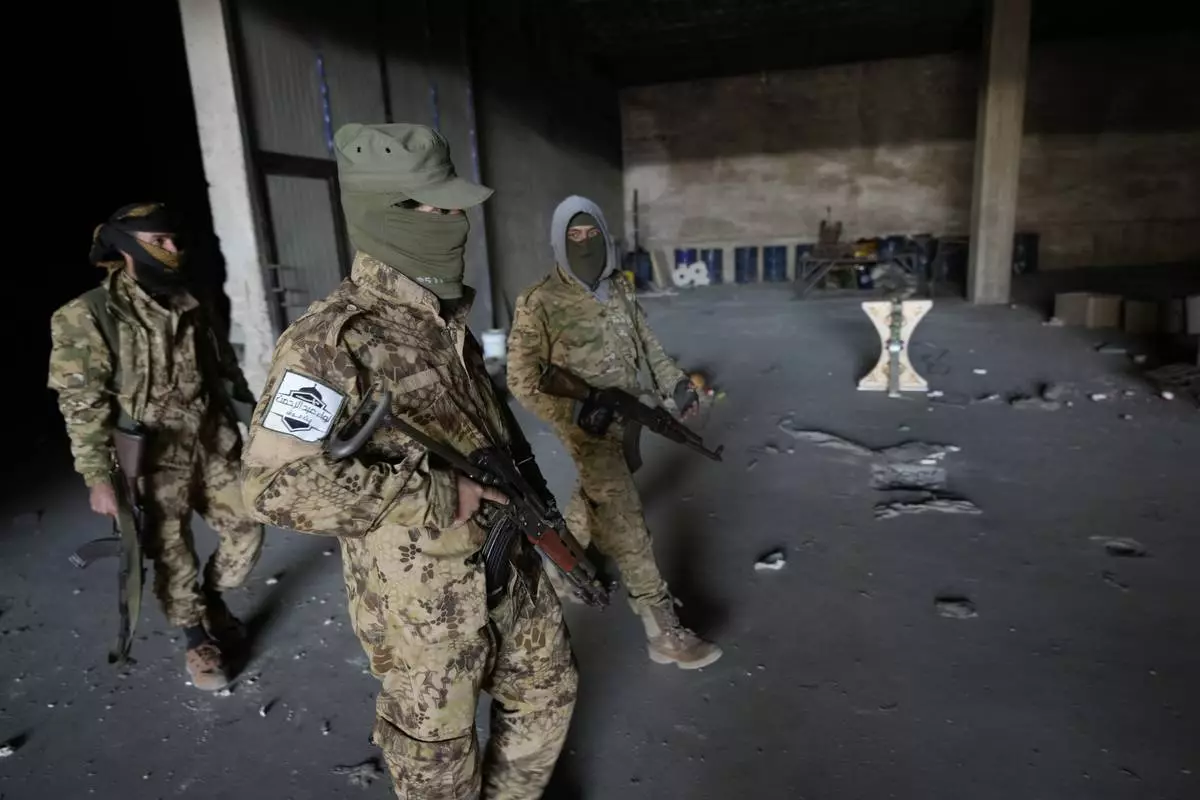
Syrian members of the rebel group walk at a warehouse where the amphetamine pills known as Captagon was manufactured before the fall of Bashar Assad government in Douma city, outskirts of Damascus, Syria, Friday, Dec. 13, 2024. (AP Photo/Hussein Malla)
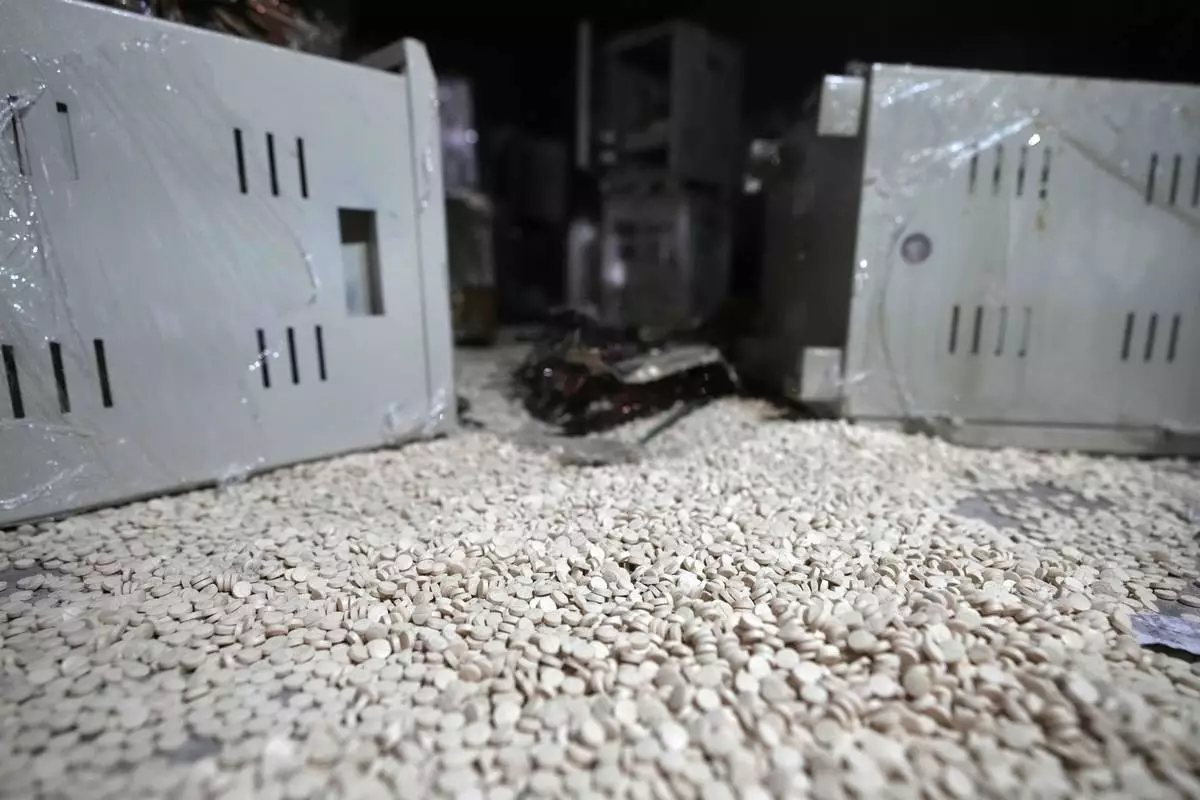
Amphetamine pills, known as Captagon, which were prepare to be hidden inside electrical components, are seen at the warehouse where the drug was manufactured before the fall of Bashar Assad government at a facility in Douma city, outskirts of Damascus, Syria, Friday, Dec. 13, 2024. (AP Photo/Hussein Malla)
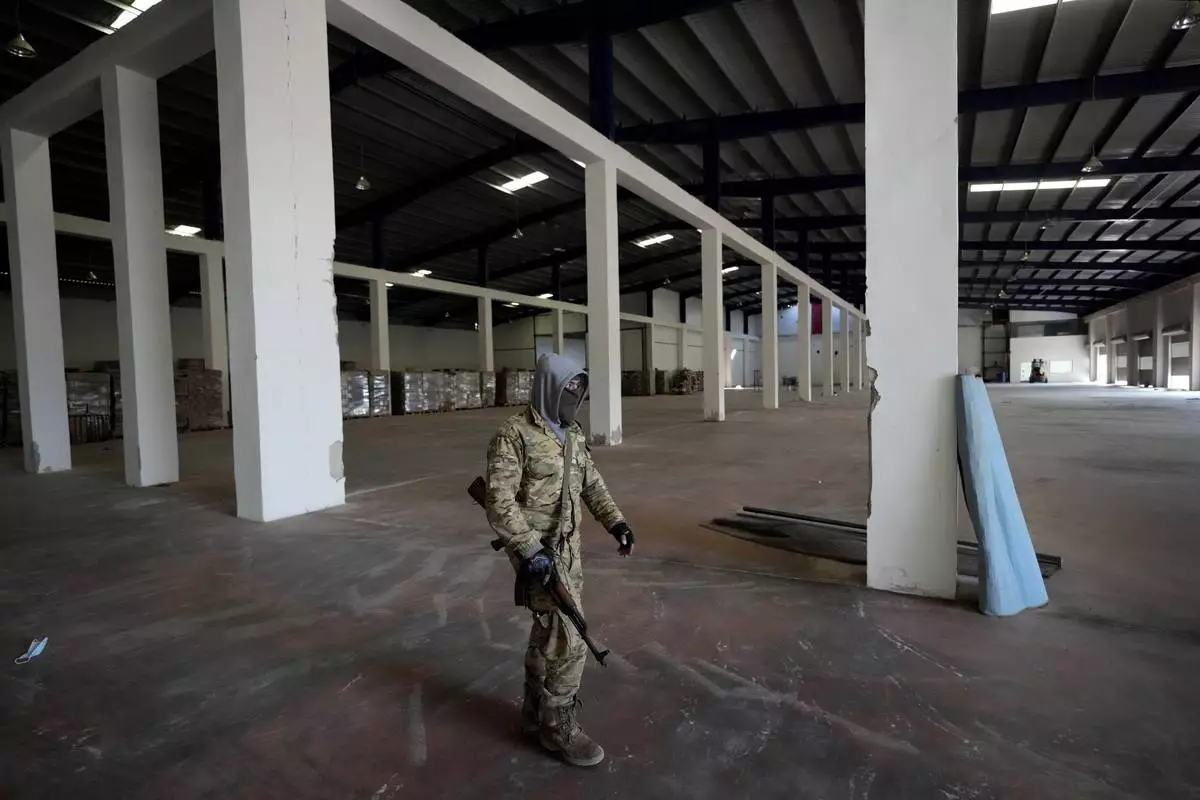
A Syrian member of the rebel group walks at a warehouse where the amphetamine pills known as Captagon were manufactured before the fall of Bashar Assad government in Douma city, outskirts of Damascus, Syria, Friday, Dec. 13, 2024. (AP Photo/Hussein Malla)
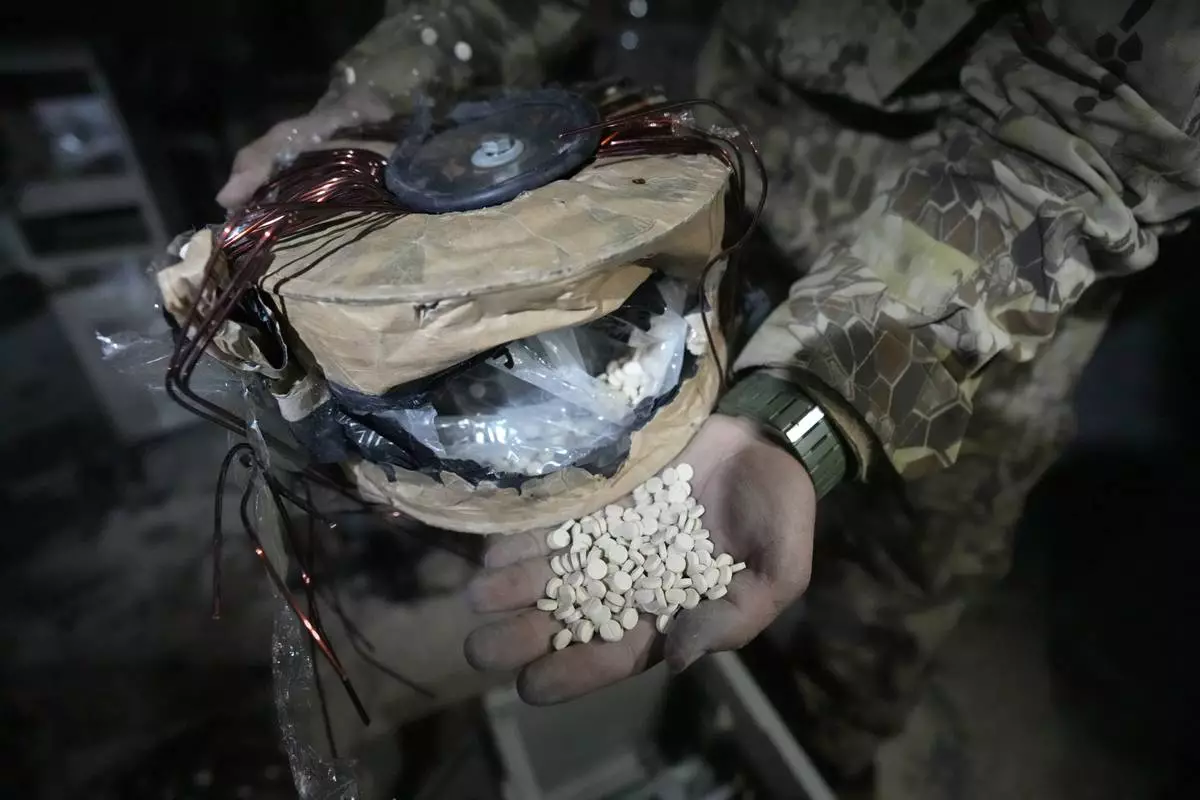
A Syrian member of the rebel shows amphetamine pills known as Captagon hidden inside an electrical component at a warehouse where the drug was manufactured before the fall of Bashar Assad's government at a facility in Douma city, outskirts of Damascus, Syria, Friday, Dec. 13, 2024. (AP Photo/Hussein Malla)
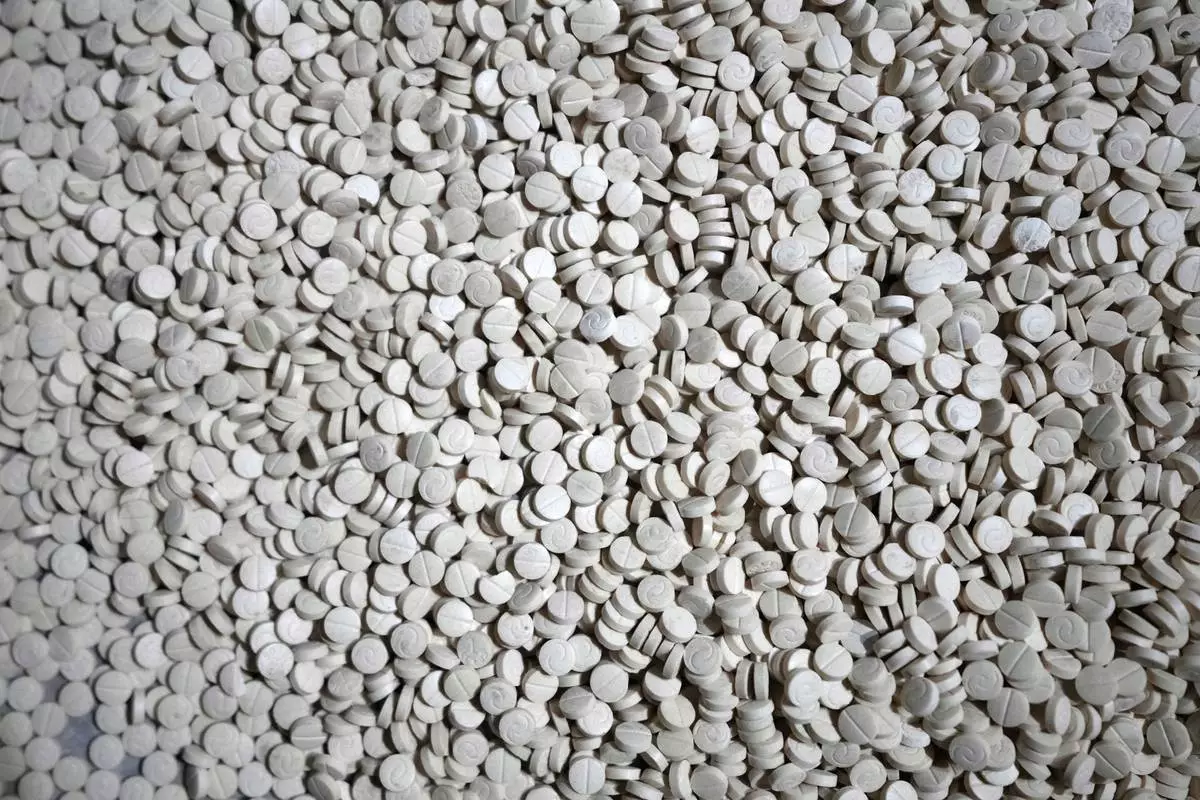
Amphetamine pills, known as Captagon, are seen inside electrical components as they were prepared to be hidden, at the warehouse where the drug was manufactured before the fall of Bashar Assad government at a facility in Douma city, outskirts of Damascus, Syria, Friday, Dec. 13, 2024. (AP Photo/Hussein Malla)
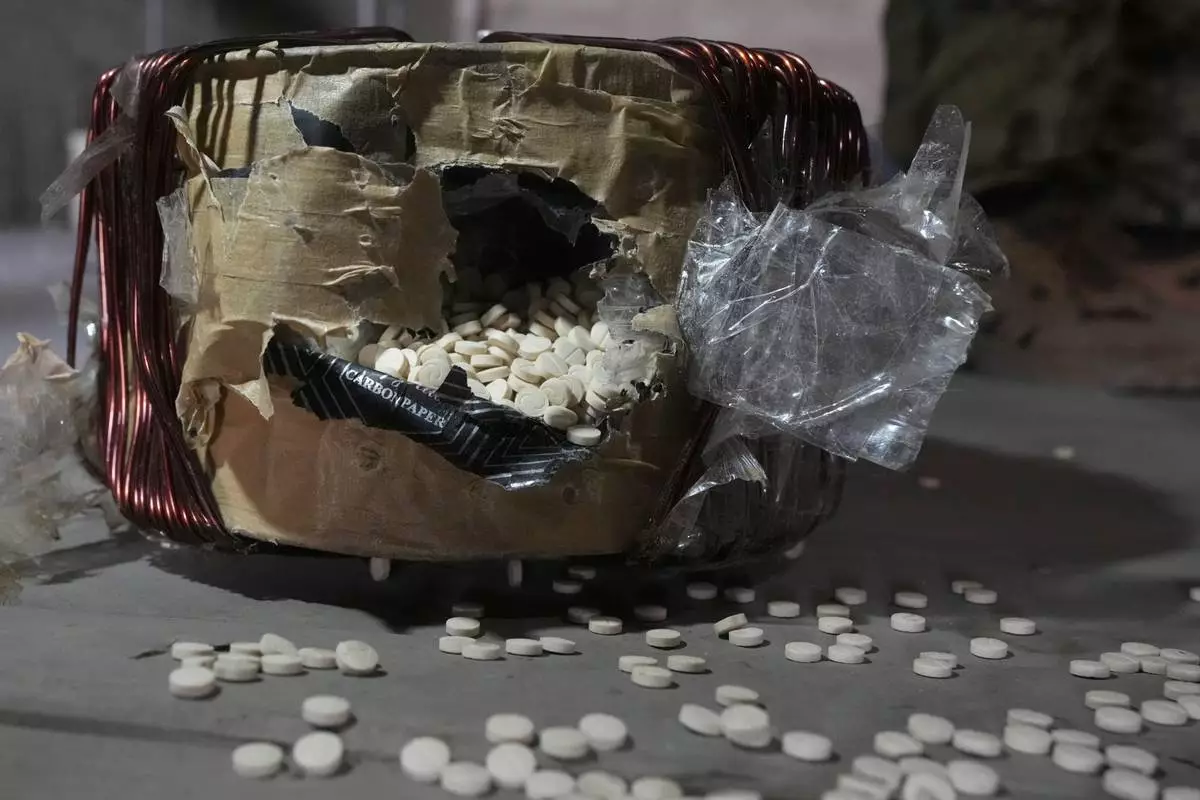
Amphetamine pills, known as Captagon, hidden inside an electrical component at the warehouse where the drug was manufactured before the fall of Bashar Assad government at a facility in Douma city, outskirts of Damascus, Syria, Friday, Dec. 13, 2024. (AP Photo/Hussein Malla)
The Israeli military on Wednesday ordered Palestinians to evacuate another section of central Gaza ahead of an offensive in the built-up Bureij refugee camp, even as Israel and the Hamas appeared to inch closer to a ceasefire in the 14-month war.
Israeli President Isaac Herzog said he will meet Wednesday with U.S. President-elect Donald Trump's Mideast envoy, Adam Boehler, at home in Jerusalem. Boehler, a former aid to Jared Kushner, met with Prime Minister Benjamin Netanyahu earlier this week.
As deadly Israeli strikes pound Gaza each day, talks to broker the ceasefire and hostage release deal have restarted after a monthslong pause. The deal on the table includes a six-week pause in fighting in which Hamas would release 30 hostages, including three of four dual Israeli-U.S. citizens. In exchange, Israel would release hundreds of Palestinian prisoners. Trump has said he wants a quick end to the war.
Israeli bombardment and offensives in Gaza have killed more than 45,000 Palestinians during the war, according to the Gaza Health Ministry. The ministry’s tally does not distinguish between combatants and civilians, but it says more than of half the dead were women and children.
Israel launched the war in retaliation for Hamas’ October 2023 attack on southern Israel in which militants killed some 1,200 people and abducted 250 others, around 100 of whom remain in captivity. Israel believes a third of the remaining hostages are dead.
Here’s the latest:
DAMASCUS — The Syrian Civil Defense group, known as the White Helmets, uncovered at least 21 corpses as well as incomplete human remains on Wednesday in the Sayyida Zeinab suburb of the capital Damascus.
The discovery was made at a site previously used by Lebanon’s Hezbollah and Iran-backed Iraqi militias, both allies of deposed President Bashar Assad during the country’s civil war. The site included a field kitchen, a drugstore and a morgue, according to Ammar al-Salmo, an official with the White Helmets, a volunteer organization that operated in areas that were controlled by the opposition.
Rescue teams in white hazmat suits searched the site, located not far from the revered shrine of Sayyida Zeinab, the granddaughter of Prophet Mohammad. The remains were placed into black bags and loaded onto a truck as bystanders from the neighborhood looked on.
“Some (of the remains) are skeletons, others are incomplete, and there are bags of small bones. We cannot yet determine the number of victims,” al-Salmo said.
“Damascus has become a mass grave,” he said, pointing out the growing reports of war-related graves and burial sites in the capital and other places in Syria.
Iran and Hezbollah provided Assad’s government with military, financial and logistical support during the civil war.
JERUSALEM — A group of Israeli settlers have briefly crossed the border into Lebanon before they were removed by troops, the military acknowledged Wednesday.
The civilians who crossed the border came from the Uri Tzafon movement, a group calling for Israeli settlement of southern Lebanon. Photos posted by the group online Saturday showed a small group of activists holding signs and erecting tents inside Lebanon while Israeli soldiers were present.
After first denying the reports to Israeli media, the military said Wednesday that civilians had crossed the border “by a few meters” and were removed by troops.
The military called the border breach a “serious incident” and said it was investigating.
“Any attempt to approach or cross the border into Lebanese territory without coordination poses a life-threatening risk and interferes with the IDF’s ability to operate in the area and carry out its mission,” the military said, using the acronym for the Israel Defense Forces.
The settler group Uri Tzafon, which means “Awaken the North” in Hebrew, crossed the border in the area of the Lebanese village of Maroun Al-Ras. In the past, the movement has said the area is home to an old Hebrew settlement.
Groups of settler activists also have breached the Gaza border more than once since the Israel-Hamas war erupted on Oct. 7, 2023, at one point erecting small wooden tents before they were evacuated by troops. Daniela Weiss, the leader of the movement to resettle Gaza, claims she has entered Gaza twice since the start of the war.
Israel’s settler movement has been emboldened by its current government -- the furthest-right in Israeli history -- and is now seeking to expand to parts of southern Lebanon and the north of the Gaza.
DAMASCUS, Syria — The U.N. envoy to Syria said after concluding a visit to Damascus and meeting the new administration that the country needs “a political transition that will be credible, inclusive and include the broadest range of the Syrian society and Syrian parties.”
Geir Pedersen said Wednesday that the process should take place under a U.N. resolution adopted in 2015 to help negotiate a political solution between the government of now-deposed President Bashar Assad and the opposition.
“There is a lot of hope. We can all see the beginning of a new Syria ... that in line with Security Council Resolution 2254 will adopt a new constitution that will ensure that there is a new social contract for all Syrians and that we will have free and fair elections when that time comes after a transitional period, also in line with Security Council Resolution 2254,” Pedersen said.
It is not yet clear if Hayat Tahrir al-Sham, or HTS, the main former rebel group now in control of Syria, will pursue such a process. The group has set up an interim administration comprising members of its “salvation government” that had ruled its former stronghold in northern Syria. It will oversee the country until March, but the new rulers have not made clear how the transition to a fully empowered government would take place.
Pedersen also warned of ongoing violence in parts of the country, particularly in the northeast, where U.S.-backed, Kurdish-led forces and Turkish-backed armed groups have clashed, and called for humanitarian assistance and for starting a process to end Western sanctions on Syria.
JERUSALEM — Hundreds of Israeli students walked out of school Wednesday to call for an immediate deal to release the remaining hostages held by Hamas in the Gaza Strip as there appears to be progress in ceasefire talks.
From Tel Aviv to Jerusalem, students headed for central junctions, blocking roads and holding signs with the faces of the captives remaining in Gaza after 14 months of war.
There are 100 hostages in Gaza, a third of whom Israel’s government says are dead. Hamas militants dragged them to Gaza in the October 2023 attack on Israel that sparked the war.
At the high school in central Israel attended by hostages Naama Levy and Guy Illouz, who Israel’s military says was killed in the Oct. 7 attack, students crammed the auditorium with signs reading “Bring them Home Now.”
In Tel Aviv, high school students chanted, “Their time is up. There’s a deal on the table.”
TEL AVIV, Israel — Prime Minister Benjamin Netanyahu took the stand on the fourth day of testimony in his corruption trials Wednesday, saying the accusations against him are “idiotic.”
Netanyahu, the first sitting Israeli leader to take the stand as a criminal defendant, is on trial on charges of fraud, breach of trust and accepting bribes in three separate cases.
Netanyahu was supposed to testify on Tuesday, but it was canceled after he requested a postponement due to “security reasons.”
Netanyahu went to the summit of Mount Hermon, part of the Syrian buffer zone that Israeli forces seized after President Bashar Assad was ousted by rebels last week. It appeared to be the first time an Israeli leader had set foot that far into Syria.
The testimony, set to take place six hours a day, three days a week for several weeks, will take up a significant chunk of Netanyahu’s working hours. Critics ask if he can capably manage a country embroiled in a war on one front, containing the fallout from a second, and keeping tabs on other potential regional threats, including from Iran.
DAMASCUS, Syria — The Damascus airport reopened Wednesday for the first time since the fall of the government of Bashar Assad, and the first civilian plane took off from Damascus and landed in the northern city of Aleppo.
The airport is currently open only to domestic flights, but Syrian airspace is open to international traffic.
Airport officials have not yet specified when international flights will resume at the Damascus airport, but Saad Khair Bec, technical supervisor, called Wednesday’s reopening “an important day in the life of the Syrian people ... after the fall of the former shabby regime.”
State institutions have been gradually returning to work in recent days, including the main port in the coastal city of Latakia.
GENEVA — The head of the U.N. migration agency said she was reassured by commitments she heard from Syria’s new caretaker government in meetings in Damascus, as the country seeks to rebuild after more than a half-century of rule under the Assad family.
Amy Pope, director-general of the International Organization for Migration, said in a phone interview Wednesday that Syria’s new leaders “recognize the job they have ahead of them is enormous and that they need the support of the international community.”
IOM estimates about 100,000 people — many looking to return to their former homes — have entered Syria from neighboring countries since Dec. 8, the day former President Bashar Assad fled the country as opposition fighters swarmed into the capital.
“We are also seeing about 85,000 people come out” of Syria into Lebanon through established border crossing points, she said. “It’s a rough figure: There’s certainly people who cross informally and so they’re not counted.”
Most of those found to be leaving are Shiite Muslims, she said. The armed groups who took control of Syria are primarily from the country’s majority Sunni Muslim community, including Hayat Tahrir al-Sham, the terrorist-designated group that led the coalition of armed opposition groups that drove Assad from power.
“There’s no question to me that at this moment in time, they are looking for ways to make this work, to be more inclusive, to build partnerships across the international community, to build partnerships with other governments,” Pope said of the caretaker government. “It’s just going to be a question of whether they can deliver.”
IOM said Pope was one of the first heads of a U.N. agency to visit Syria since Assad’s ouster, and she met with unspecified members of the caretaker government on Tuesday, as well as U.N. officials and advocacy groups.
She reaffirmed the IOM's commitment to Syria. The organization has been providing assistance to people in the country since 2014 and is seeking $30 million in urgent aid funding for the next four months to try to help nearly 685,000 people in the northwest of the country.
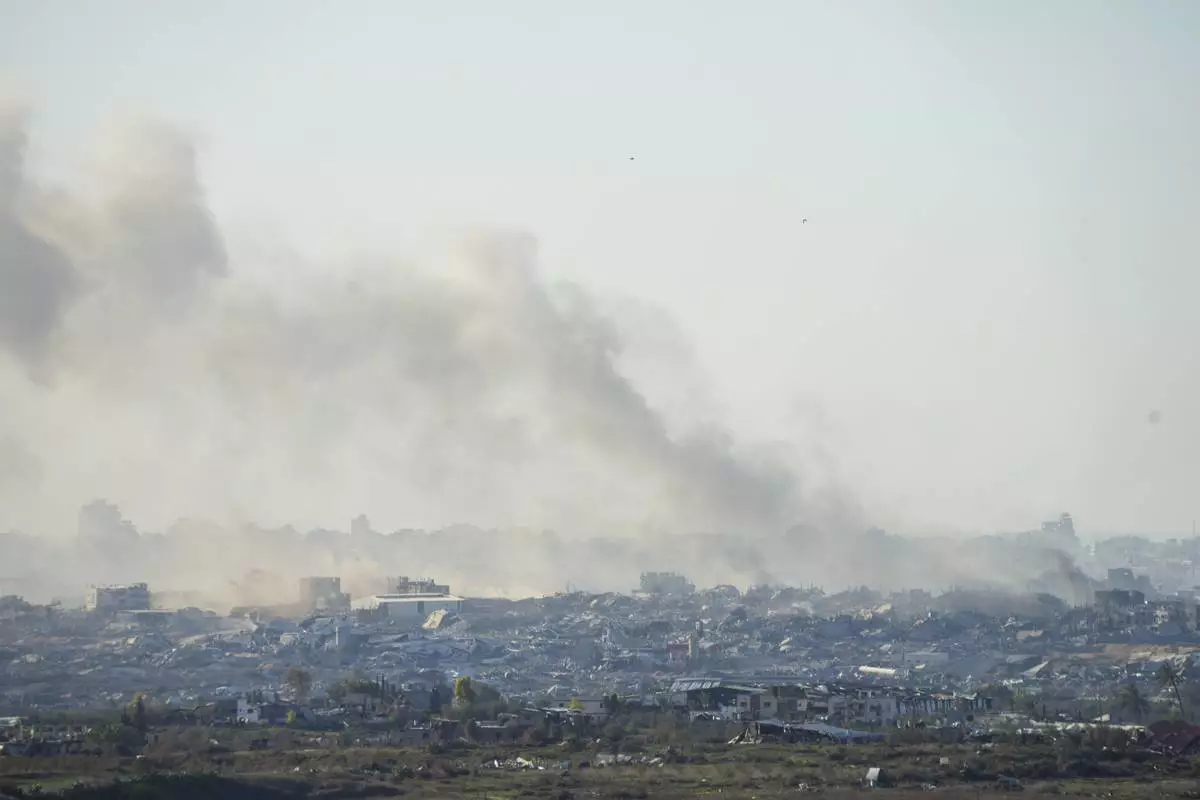
Smoke rises following an explosion in the Gaza Strip as seen from southern Israel, Wednesday, Dec.18, 2024. (AP Photo/Ohad Zwigenberg)
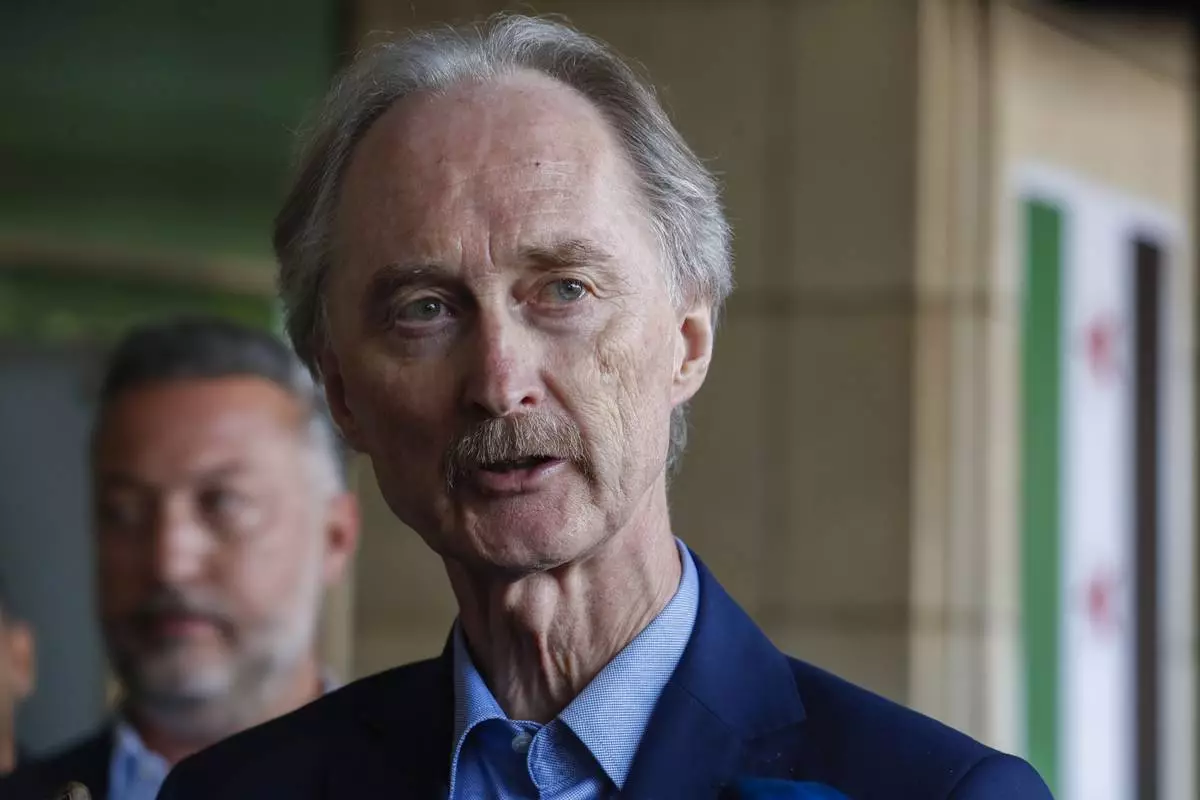
Geir Pedersen, the United Nations' special envoy to Syria, speaks to journalists in Damascus, Syria, Wednesday, Dec. 18, 2024. (AP Photo/Omar Sanadiki)
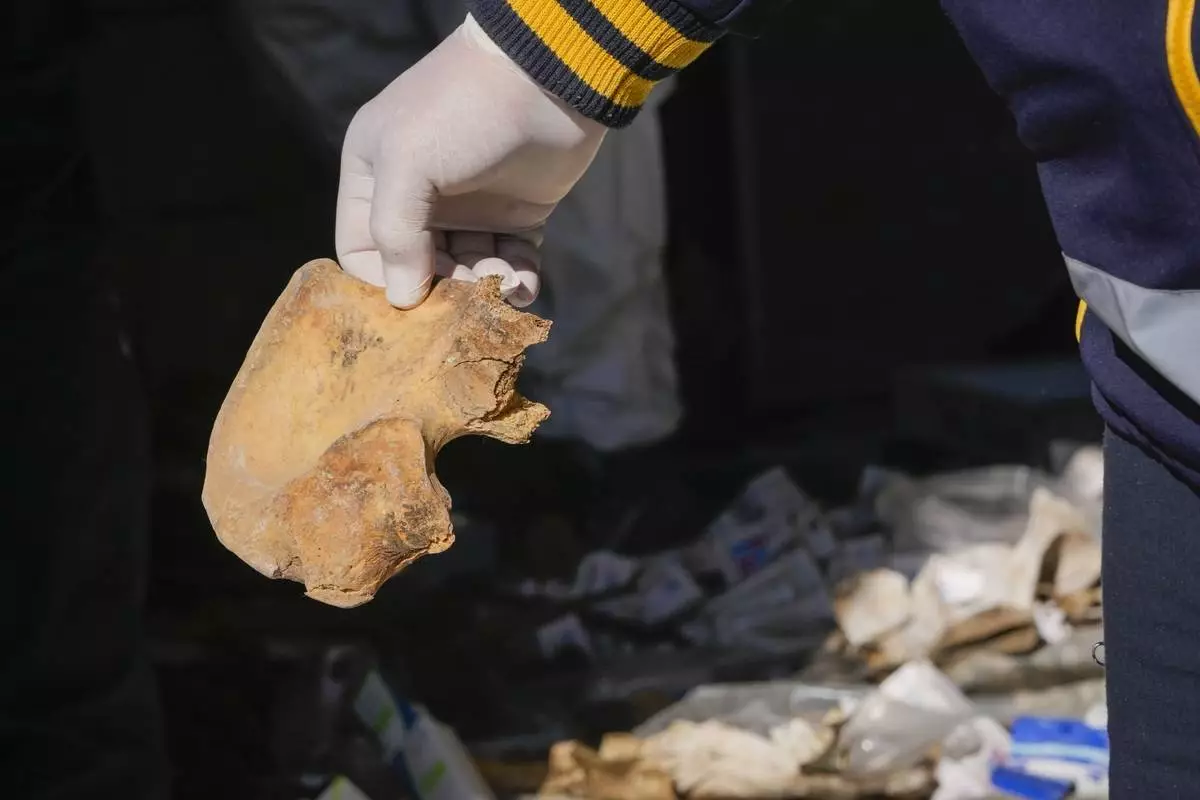
A member of the Syrian civil defense group, known as the White Helmets, holds up a human bone while searching for bodies at a morgue previously used by pro-government Iranian units, located near the Set Zainab shrine, south of Damascus, Syria, on Wednesday, Dec. 18, 2024 (AP Photo/Hussein Malla)
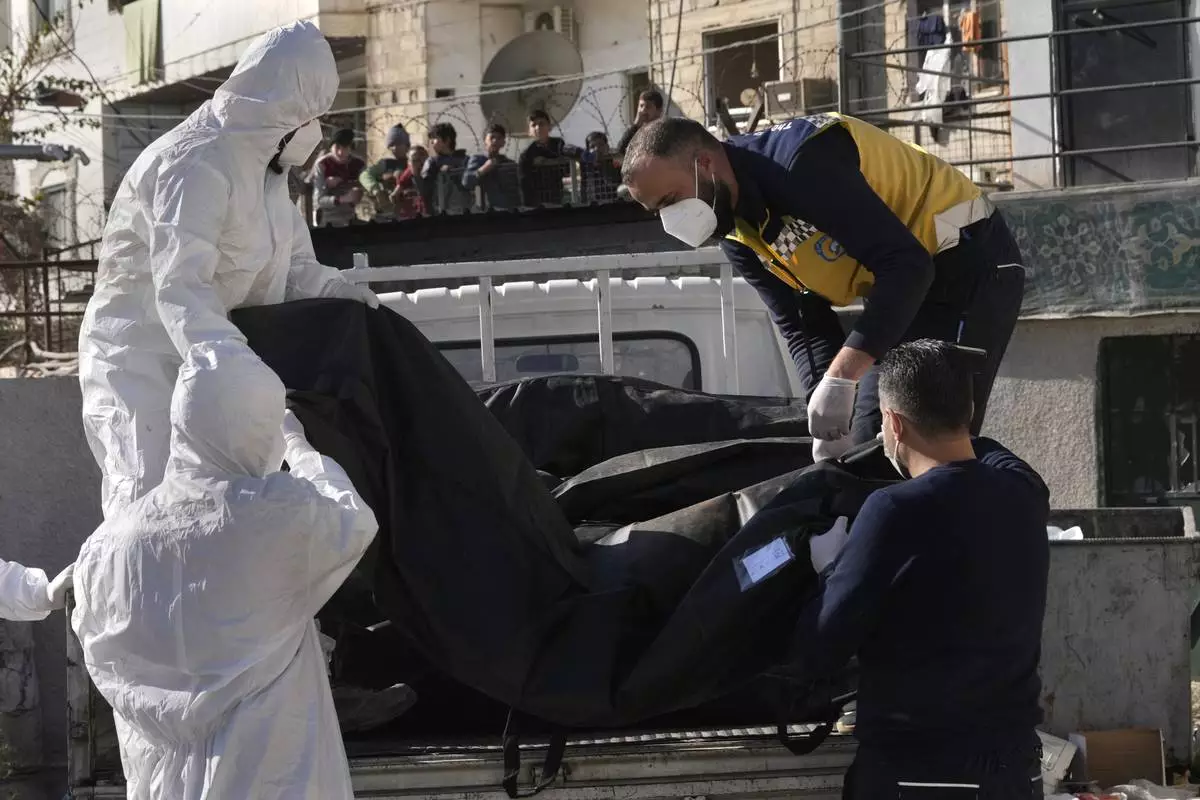
Members of the Syrian civil defense group, known as the White Helmets, put on a truck bodies and human remains after they collect them from a morgue, previously used by pro-government Iranian units, located near the Set Zainab shrine, south of Damascus, Syria, Wednesday, Dec. 18, 2024. (AP Photo/Hussein Malla)

A Syrian fighter rides his motorcycle along a highway in Damascus, Syria, Wednesday, Dec. 18, 2024. (AP Photo/Hussein Malla)
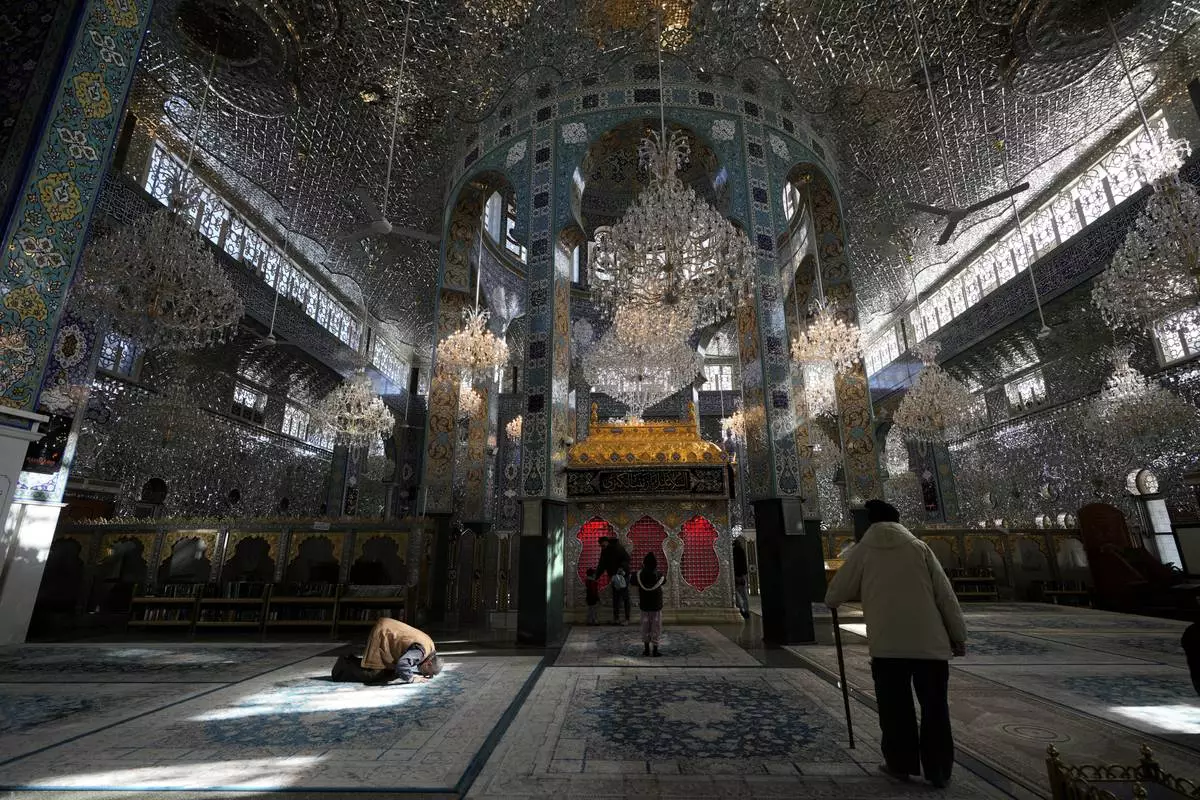
Syrians pray at the shrine of al-Sayydah Zeinab, the grand daughter of Prophet Mohammed, south of Damascus, Syria, Wednesday, Dec. 18, 2024. (AP Photo/Hussein Malla)
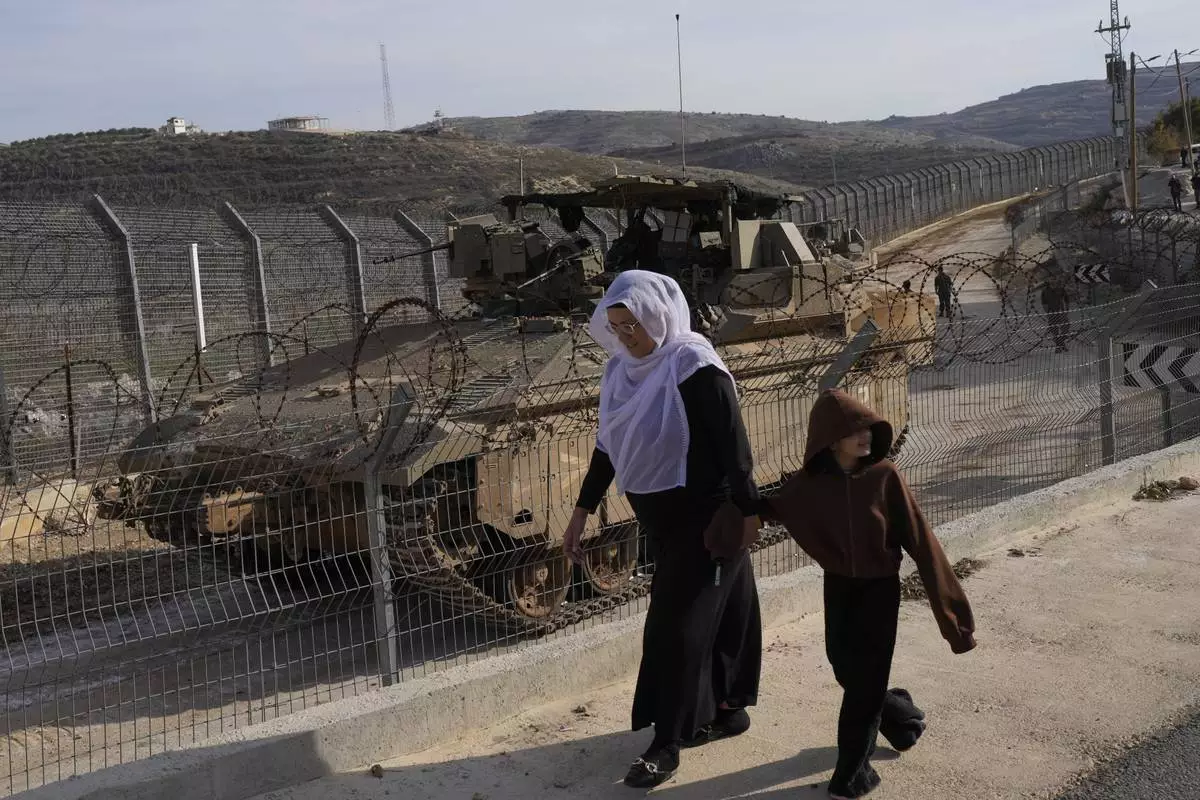
A woman and child walk past Israeli armored vehicles parked near the "Alpha Line" that separates the Israeli-annexed Golan Heights from Syria, in the town of Majdal Shams, Monday, Dec. 9, 2024. (AP Photo/Matias Delacroix)
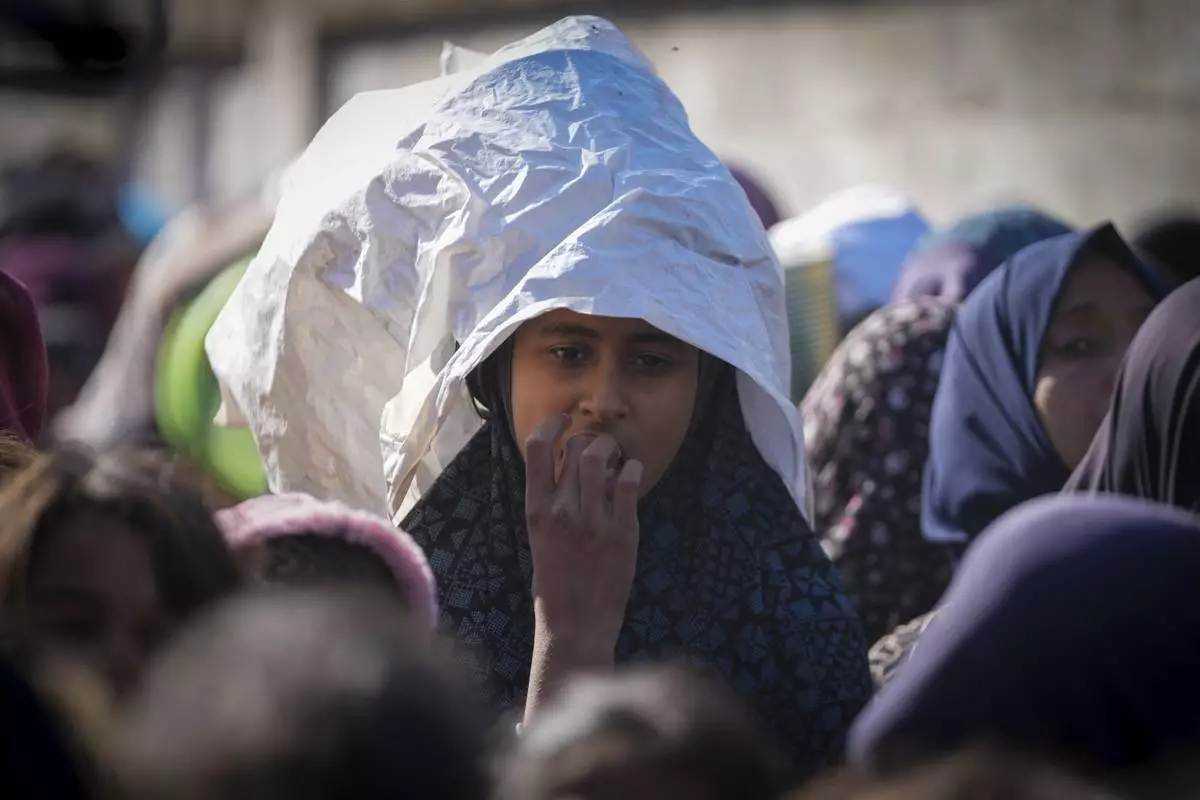
A Palestinian girl waits in line for food at a distribution center in Deir al-Balah, Gaza Strip, Tuesday, Dec. 17, 2024. (AP Photo/Abdel Kareem Hana)
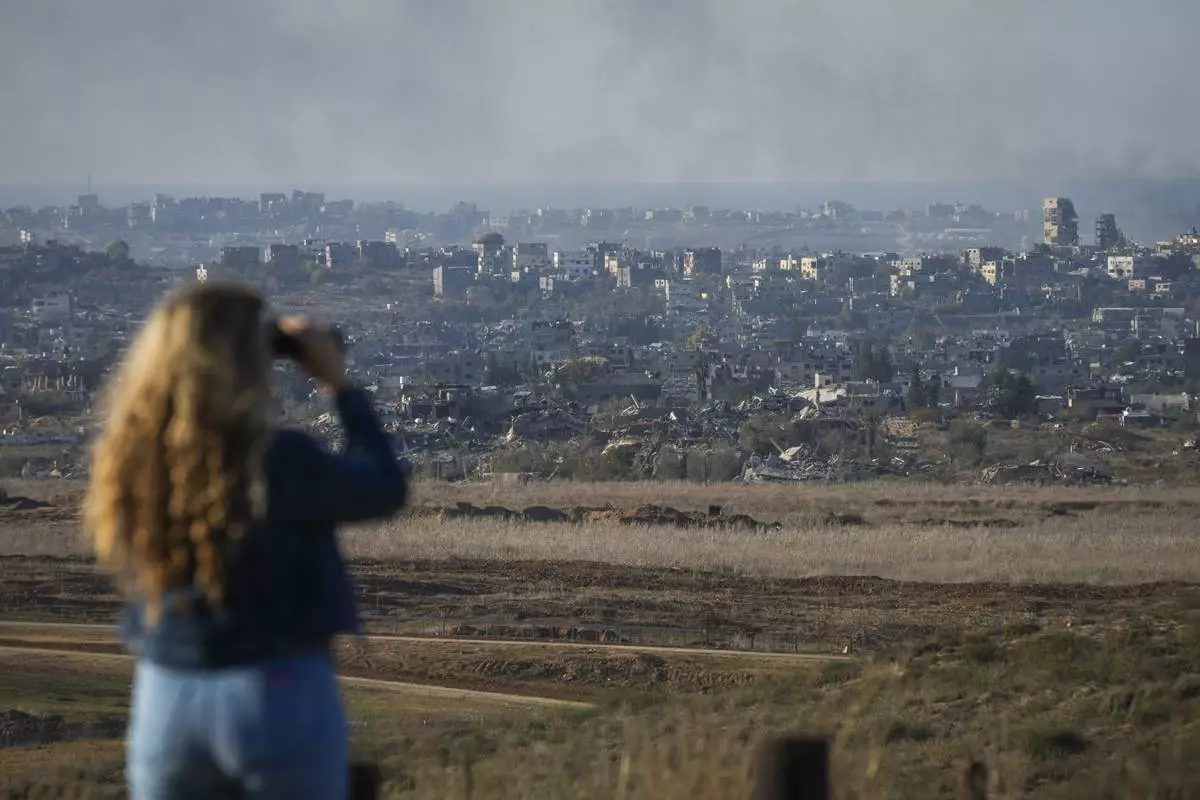
A woman uses binoculars to watch smoke rising following an explosion in the Gaza Strip as seen from southern Israel, Wednesday, Dec.18, 2024. (AP Photo/Ohad Zwigenberg)
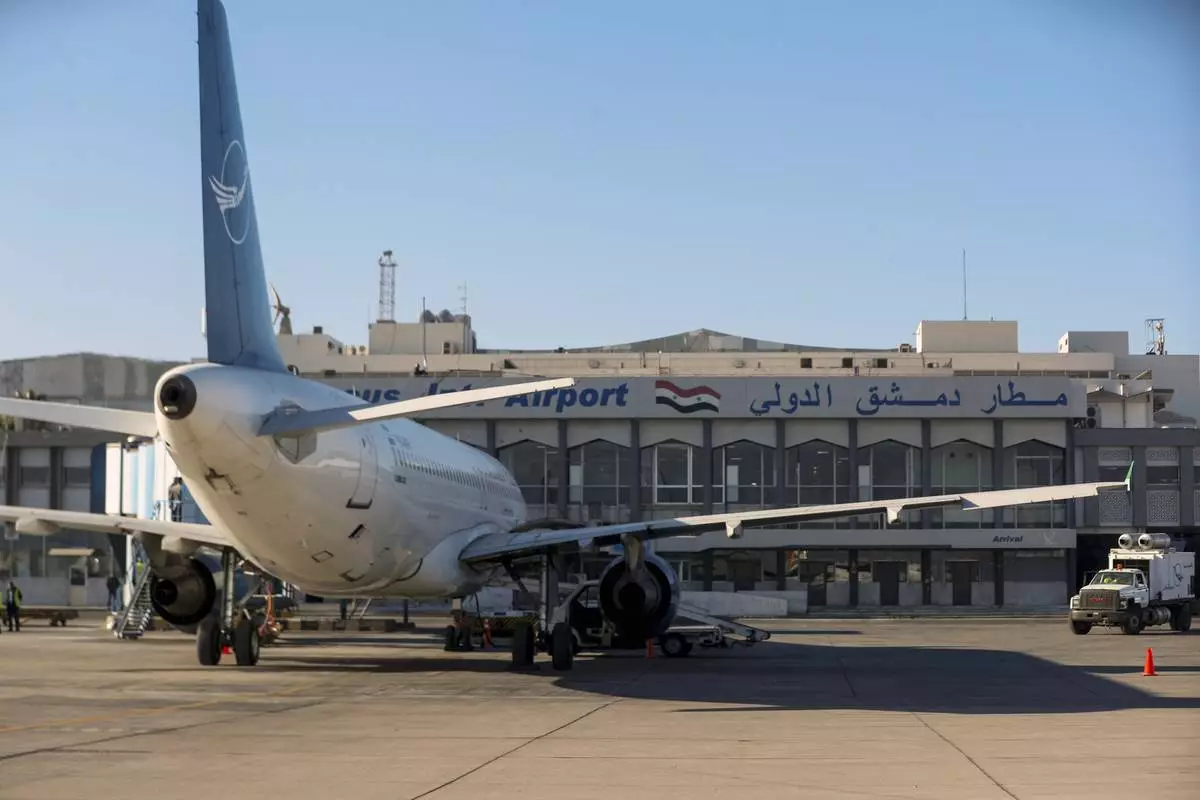
A Syrian Air airplane is seen parked at the terminal as the airport reopens for internal flights in Damascus, Syria, Wednesday, Dec. 18, 2024. (AP Photo/Omar Sanadiki)

A man with a Syrian "revolutionary" flag sits inside a Syrian Air airplane ahead of take-off as the airport reopens for internal flights in Damascus, Syria, Wednesday, Dec. 18, 2024. (AP Photo/Omar Sanadiki)
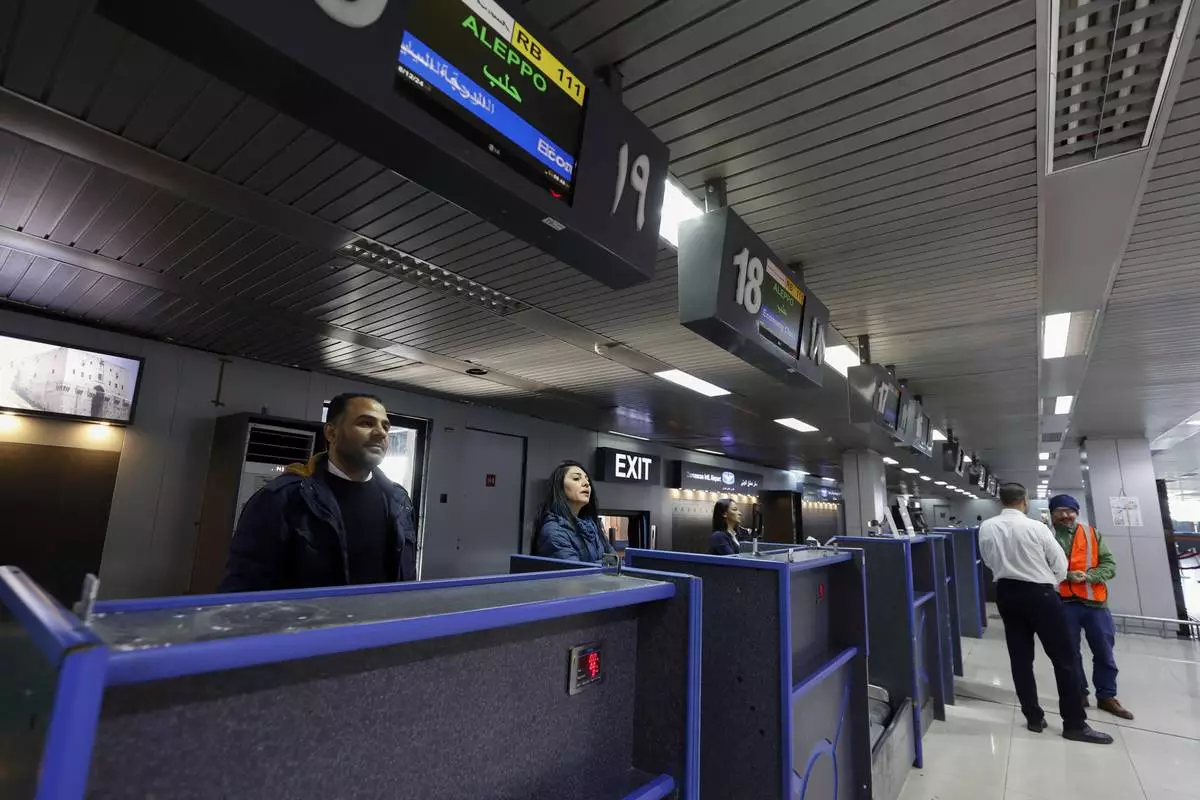
Employees stand at check-in counters as the airport reopens for domestic flights in Damascus, Syria, Wednesday, Dec. 18, 2024. (AP Photo/Omar Sanadiki)
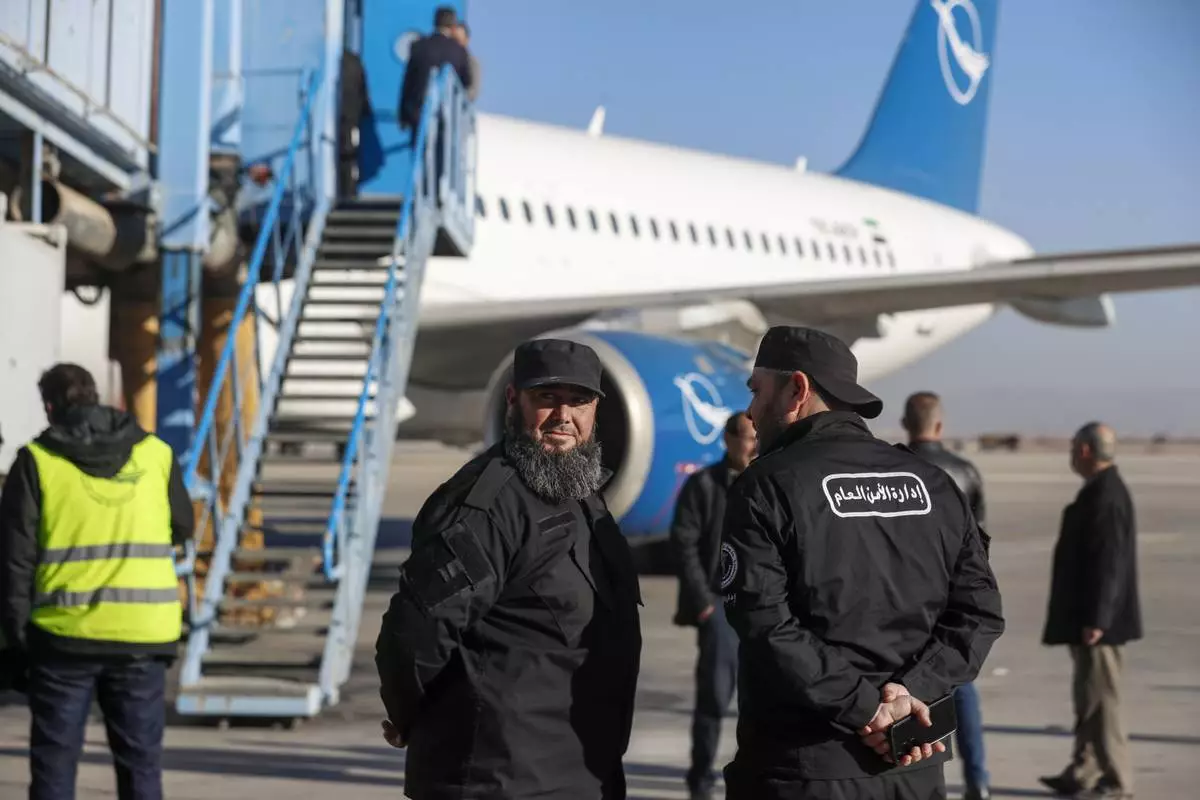
General Security personnel stand next to a Syrian Air airplane ahead of take-off as the airport reopens for internal flights in Damascus, Syria, Wednesday, Dec. 18, 2024. (AP Photo/Omar Sanadiki)
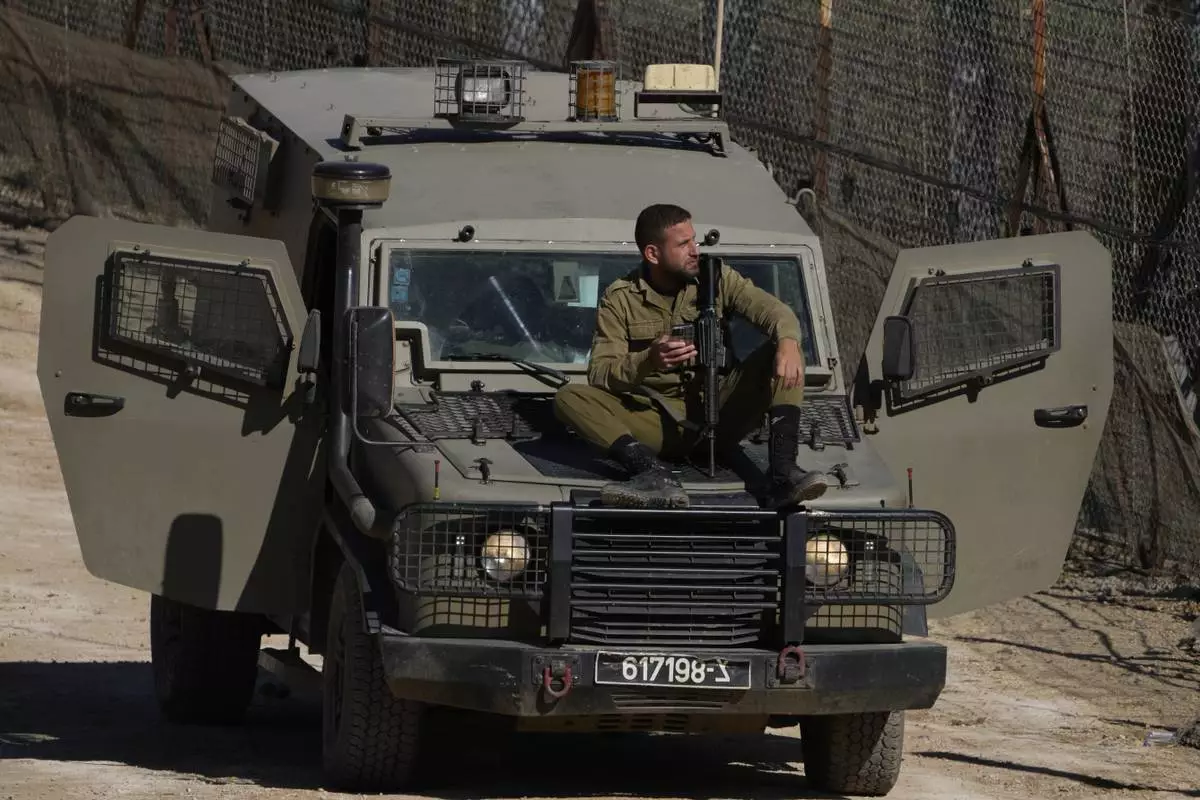
An Israeli soldier sits on an armoured vehicle next to security fence near the so-called Alpha Line that separates the Israeli-controlled Golan Heights from Syria, in the town of Majdal Shams, Wednesday, Dec. 18, 2024. (AP Photo/Matias Delacroix)

Palestinian mourners carry the body of Mohammed Abu Kishk, who was killed in clashes with Israeli forces during his funeral at the Askar refugee camp in the Israeli-occupied West Bank, Dec. 17, 2024 (AP Photo/Majdi Mohammed).
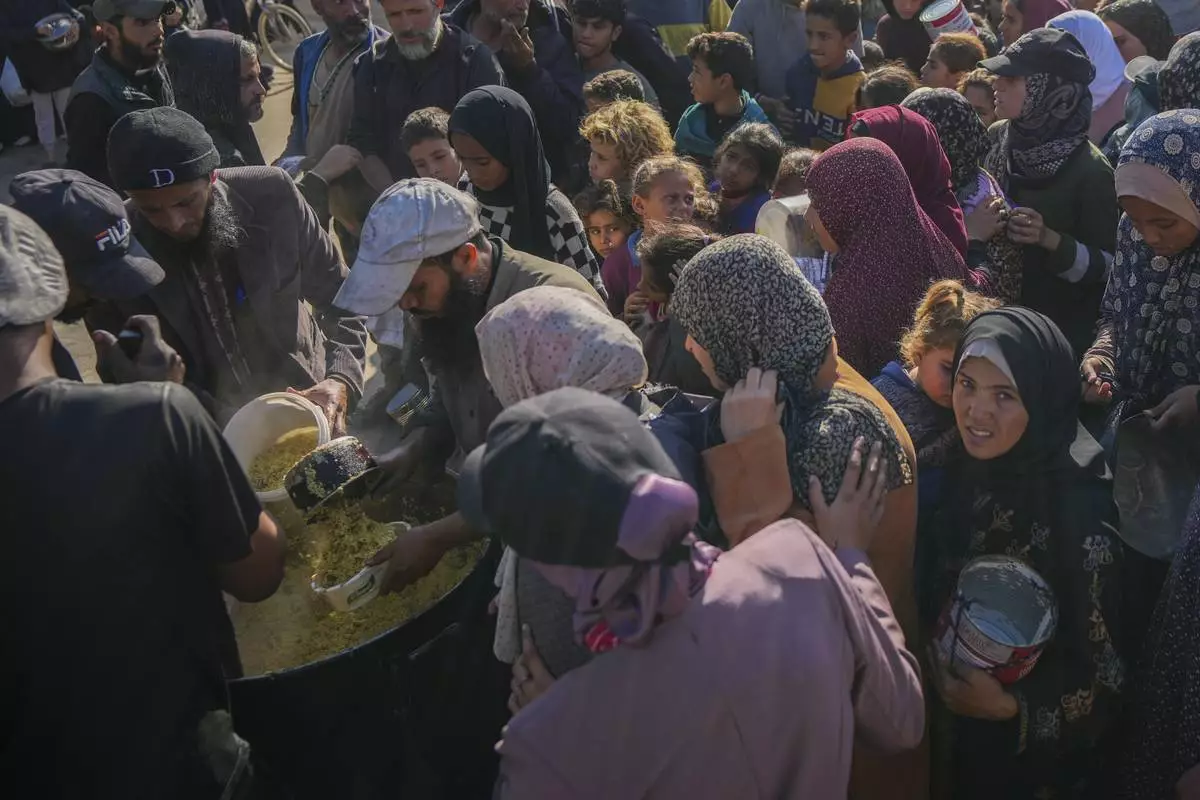
Palestinians gather to get donated food at a distribution center in Deir al-Balah, Gaza Strip, Tuesday, Dec. 17, 2024. (AP Photo/Abdel Kareem Hana)
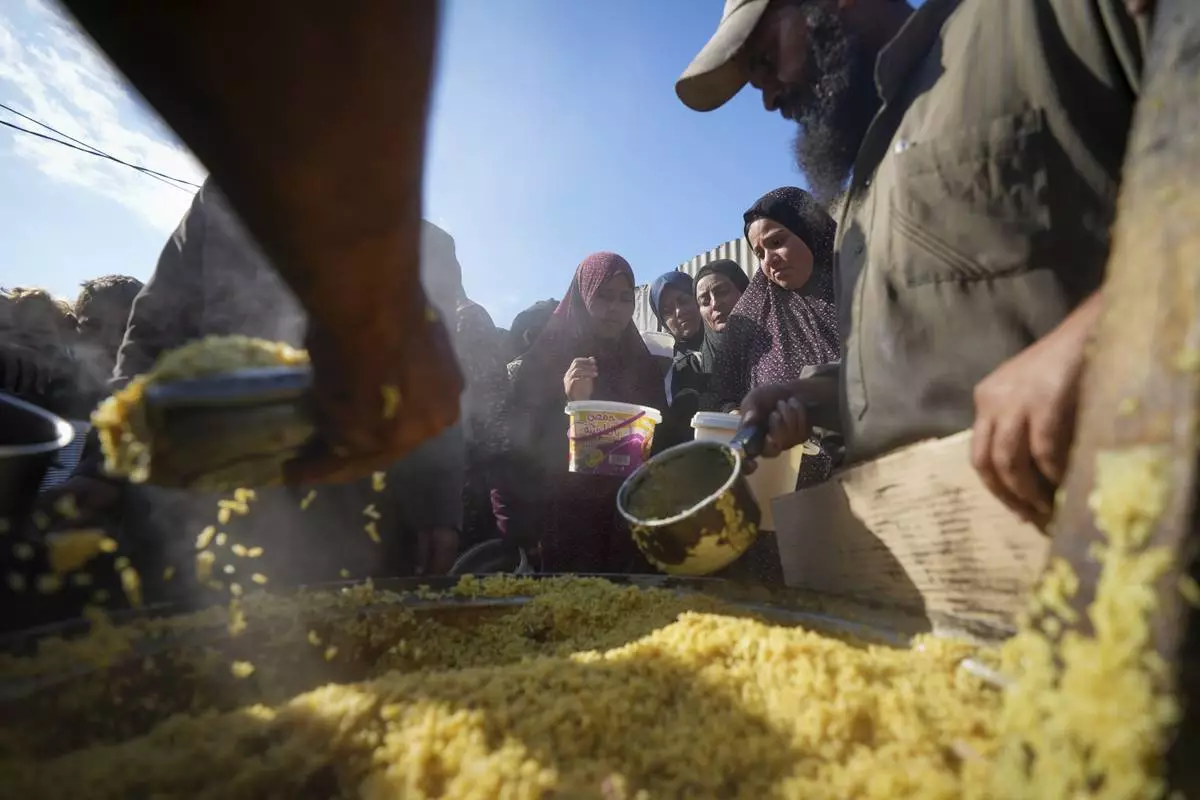
Palestinian women wait to receive food at a distribution center in Deir al-Balah, Gaza Strip, Tuesday, Dec. 17, 2024. (AP Photo/Abdel Kareem Hana)
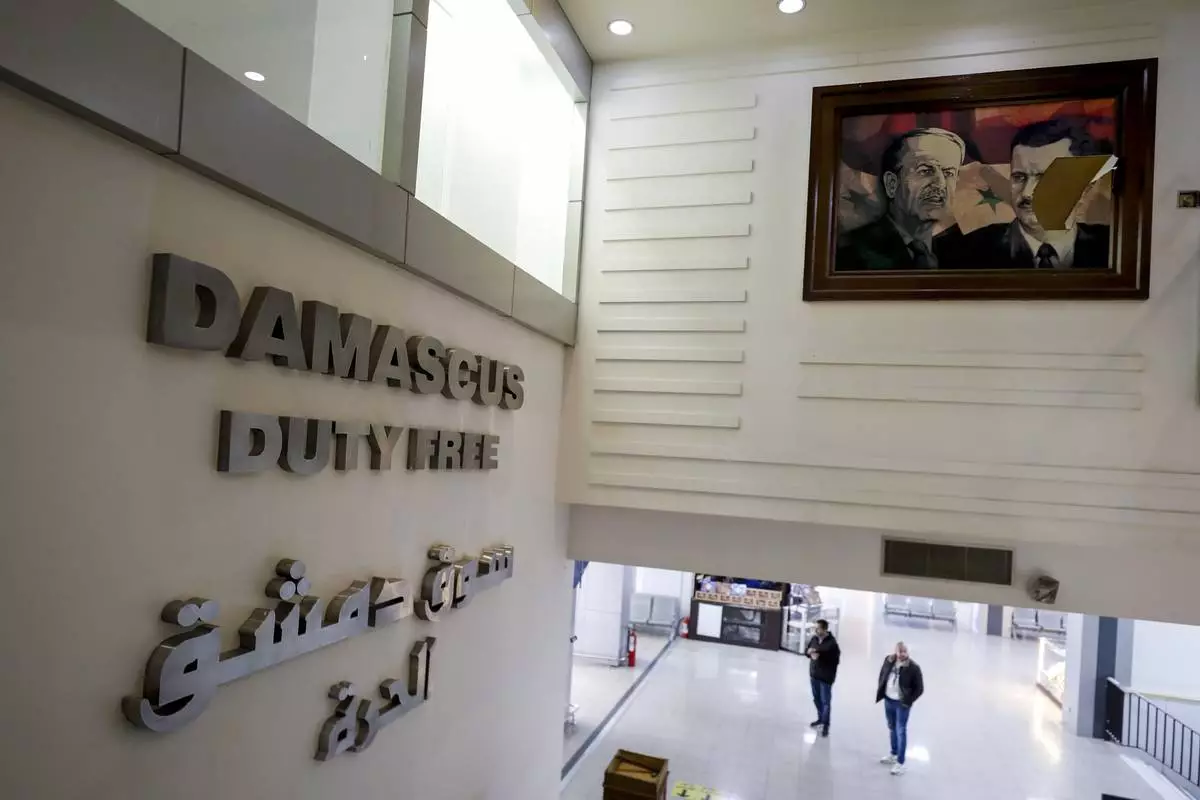
A torn picture of ousted Syrian President Bashar Assad, right, and his late father, President Hafez Assad, is seen attached at the Duty Free of the Damascus airport, Syria, Wednesday, Dec. 18, 2024. (AP Photo/Omar Sanadiki)














